The document discusses Senator Joseph McCarthy's anti-communist campaign and his role as a Republican senator from Wisconsin from 1947 until 1957. It highlights his accusations about communist infiltration in the U.S. government and critiques the political and media establishment that opposed him, suggesting that many of his claims have historical validity supported by subsequent evidence. The document also emphasizes that concerns about communist subversion did not end with McCarthy's censure in 1954, indicating a continued relevance of his warnings to contemporary discussions on security.

![2
_______________________________________________
Dedicated to
The Great Senator Joseph R. McCarthy
“How can we account for our present situation unless we
believe that men high in this Government are concerting to
deliver us to disaster? This must be the product of a great
conspiracy, a conspiracy on a scale so immense as to dwarf
any previous such venture in the history of man. A
conspiracy of infamy so black that, when it is finally
exposed, its principals shall be forever deserving of the
maledictions of all honest men.” [See page 80.]
------------------------
“I say that under the shadow of the most horrible and
destructive weapons that man has ever devised, we fight to
save our country, our homes, our churches, and our
children. To this cause, ladies and gentlemen, I have
dedicated and will continue to dedicate all that I have and
all that I am. And I want to assure you that I will not be
deterred by the attacks of the Murrows, the Lattimores, the
Fosters, the Daily Worker, or the Communist Party itself.
“Now I make no claim to leadership. In complete humility, I
do ask you and every American who loves this country to
join with me.”
--Senator Joseph Raymond McCarthy
_____________________________________________________________](https://image.slidesharecdn.com/mccarthyswaragainstcommunism-150816032113-lva1-app6892/85/Mccarthys-war-against-communism-2-320.jpg)
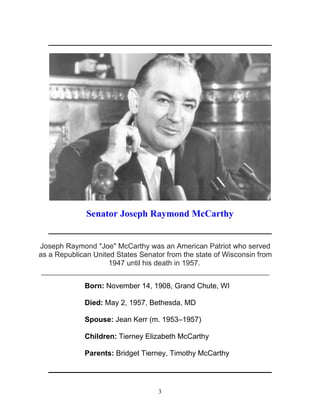
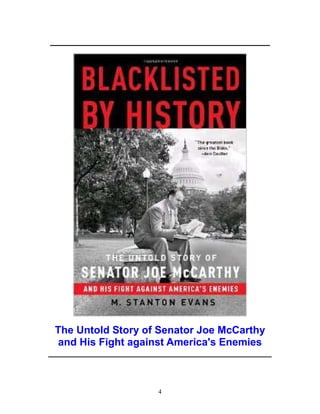
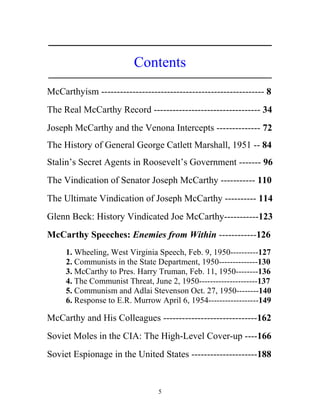
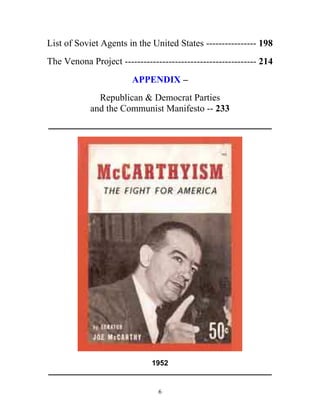
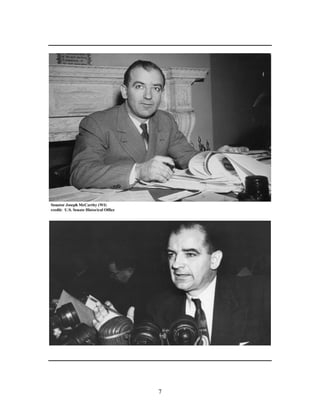
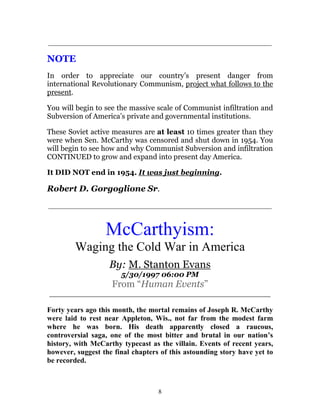
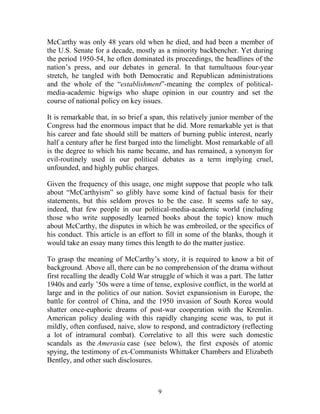
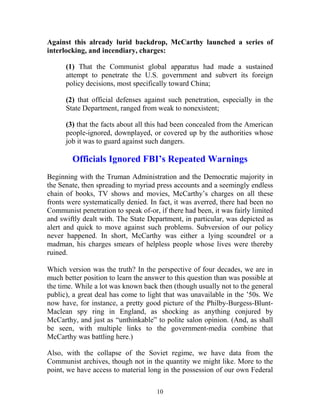
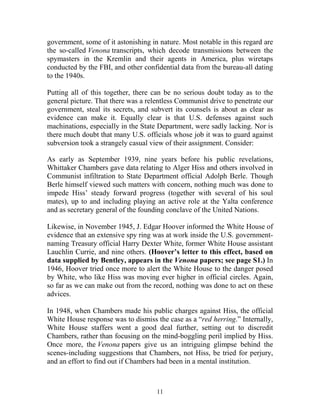
![12
As of the latter ’40s, the bizarre mindset suggested by these cases was
nowhere more pronounced than in the U.S. State Department-where it was,
for obvious reasons, also most harmful. This was to some degree ironic, as
the department had in prior years been known as a staid, conservative place
that took a tough-minded stance on issues of this type, as on most others. In
notable contrast were the laid-back security ways of war-time outfits such as
the Office of War Information (OWI) and Board of Economic Warfare
(BEW), where the “red herring” view of possible Communist infiltration
was in favor.
Beginning around 1944, however, a fierce internal struggle unfolded at
State, in which relatively hard-line anti-Communists such as Berle, Joseph
Grew and Eugene Dooman were attacked, sidetracked, or ousted. This
turnover of high-level personnel in essence was completed in the next two
years as Gen. George C. Marshall replaced James Byrnes at State, Dean
Acheson was ensconced as second in command, and “China hand” John
Carter Vincent assumed responsibility for Asia. Berle would give his own
particular view of this rolling coup d’etat as follows:
“. . . [I]n the fall of 1944 there was a difference of opinion in the State
Department. I felt the Russians were not going to be sympathetic and
cooperative. . . . I was pressing for a pretty clean-cut showdown then
while our position was strongest. The opposite group. . . in the State
Department was largely. . . Mr. Acheson’s group, with Mr. Hiss his
principal assistant in the matter. . . . I got trimmed in that fight, and,
as a result, went to Brazil, and that ended my diplomatic career.”
The major effects of this volte-face were two, both later harped on by
McCarthy. First and foremost, there was a drastic change of front in our
policy toward China. Throughout the early stages of World War II, the anti-
Communist Chiang Kai-shek had been treated as a worthy ally. The
Marshall-Acheson-Vincent team took a different view, as did a group of
Vincent’s fellow “China hands” who lobbied for an American policy more
favorable to the Communist insurgents at Yenan. The high-water mark of
this campaign was the suspension of U.S. aid to Chiang for much of the
period 1946-48, in the midst of his death struggle with the Reds.
Though it gets us a bit ahead of the story, it should be added that the anti-
Chiang jihad was not limited to “China hands” at State, but reflected a wide-
ranging governmental effort that drew heavily on the forces named by](https://image.slidesharecdn.com/mccarthyswaragainstcommunism-150816032113-lva1-app6892/85/Mccarthys-war-against-communism-12-320.jpg)
![13
Hoover. As later inquiry would disclose, Lauchlin Currie from his strategic
eyrie at the White House was very much involved, as was the Treasury’s
Harry White. (Asked about her best agents for placing Communist
personnel throughout the government, Elizabeth Bentley answered:
“I would say our two best ones were Harry Dexter White and
Lauchlin Currie. They had an immense amount of influence and knew
people, and their word would be accepted when they recommended
someone.”)
Investigations conducted in the 1950s would show that White and such of
his Treasury aides as V. Frank Coe and Solomon Adler maneuvered to block
the transfer of $200 million in gold and other credits pledged to Chiang, and
that Adler as the Treasury’s man on the scene sent back a stream of anti-
Chiang reports from China. Like White himself, both Coe and Adler would
be identified by Bentley as members of the Communist governmental
network. Also, to round out this astounding picture, it developed that Adler
shared a house in China with Communist secret agent Chi Ch’ao ting and
“China hand” John Service. (As shall be seen, such highly integrated
collaboration among seemingly disparate people was the essence of the
method.)
This was, however, by no means all. Coincident with the policy shift were
changes in departmental security practices as well. Along with the departure
of such as Grew and Berle, the old-line security team at State, headed by J.
Anthony Panuch, was also shown the door. In 1947, as a voluminous record
would reveal, the relatively tough posture favored by Panuch was replaced
by an extremely soft one. This changeover was roughly contemporaneous
with the influx of several thousand unvetted personnel from porous agencies
such as OWI and BEW, now flooding into the department. Saying that this
massive post-war merger was the main source of State’s security woes,
Panuch would testify as follows:
“. . . . In the new program of 1947, they put in what I call an overt-act
test. They specified that in order to dismiss a man for disloyalty or to
make him ineligible on loyalty grounds, there had to be reasonable
grounds to show that there was present disloyalty. . . [This was]
absolutely ineffective. You can never get the evidence. . . [The security
situation] was deteriorating when I came in there because of this](https://image.slidesharecdn.com/mccarthyswaragainstcommunism-150816032113-lva1-app6892/85/Mccarthys-war-against-communism-13-320.jpg)
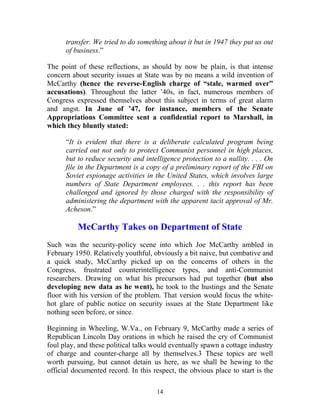

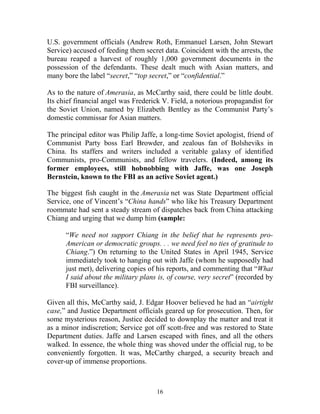
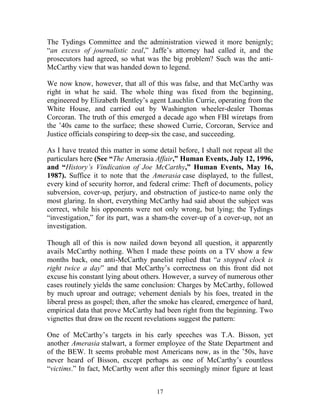
![18
half-a-dozen times for allegedly promoting the cause of the Chinese
Communists in his writings. So who was T.A. Bisson? Here is
what Venona tells us, in a transmission from Soviet agents in New York
back to Moscow Central:
“Marquis [Joseph Bernstein] has established friendly relations with T.A.
Bisson (hereafter Arthur). . . who has recently left BEW; he is now working
in the Institute of Pacific Relations (IPR) and in the editorial offices of
Marquis’ periodical [Amerasia]. . . Arthur passed to Marquis . . . copies of
four documents:
(a) His own report for BEW with his views on working out a plan for
shipment of American troops to China;
(b) A report by the Chinese embassy in Washington to its government
in China. . . .
(c) A brief BEW report of April 1943 on a general evaluation of the
forces of the sides on the Soviet-German front. . . .
(d) A report by the American consul in Vladivostok. . .”
The Joseph Bernstein to whom Bisson gave this material, be it noted, is the
selfsame Moscow agent with whom Philip Jaffe was also consorting in the
’40s. Thus Bisson not only touted the cause of the Chinese Communists, as
McCarthy had alleged, but passed confidential data to a henchman of the
KGB. McCarthy thought that Bisson was bad news, and cited evidence to
prove it. But he didn’t know for sure how bad, as reflected in these
transcripts. That secret would be locked up for 50 years, known only to the
Kremlin and the keepers of Venona.
As to the Cambridge spy ring, this had numerous links to U.S. security
issues and to McCarthy’s liberal-left opponents. Such now-notorious Soviet
agents as Philby, Burgess and Maclean were much involved in Anglo-
American security and diplomatic matters, including China, as was the
Canadian E. Herbert Norman. Even more enmeshed in U.S. affairs was
Cambridge alumnus Michael Greenberg, who made his way to the United
States and popped up, like Bisson, at IPR, then even more conveniently on
the staff of Currie. (As shall be seen, Greenberg would become one of the
supporting cast in McCarthy’s biggest single battle.)](https://image.slidesharecdn.com/mccarthyswaragainstcommunism-150816032113-lva1-app6892/85/Mccarthys-war-against-communism-18-320.jpg)
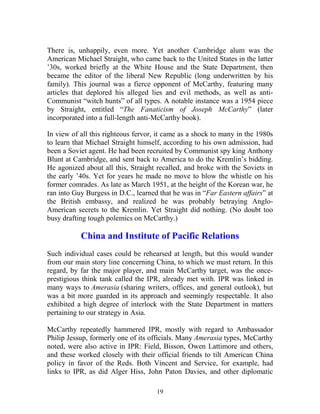

![21
sensational, and highly specific information. Even better, for those who want
to take the time, are the 5,000-plus pages of hearings and exhibits, though it
is doubtful many people would want to wade through all of these, even if
they could conveniently obtain them. Here I can but suggest the tremendous
quantity of data that the committee put together, and the main conclusions it
arrived at.
Small Pro-Red Clique in Charge
Among other things, the hearings revealed the intimate workings of IPR, and
showed that it had been effectively run by a small inner circle of officials-
chiefly such enduring mainstays as Edward Carter, Owen Lattimore,
Frederick Field, and a few others. These were in constant communication,
discussing lines of policy, materials to appear in newspapers, magazines and
books, or the agenda for some impending conference. Connected to this
inner cadre was a far-flung network of writers, researchers, speakers and
policy experts, including a substantial number who moved back and forth
among the IPR, the press corps, the academy, and the government.
Also revealed by the investigation was the truly colossal number of
Communists and pro-Communists associated with IPR, though its officials
professed not to know this. These witnesses preferred to focus attention on
the prestigious non-Communist names that appeared on their letterhead as
trustees, but there wasn’t much evidence that this otherwise busy and
important group of people had much to do with shaping program. The
policymaking stuff, and the personnel who made it, were much more along
the lines of Amerasia.
To take a specific case in point, revealing the high degree of interlock that
prevailed in all these matters, the committee examined a list of possible
attendees at an IPR conference of 1942, as recommended by Philip Jessup.
Of this projected list of 30-plus invitees, almost a third were individuals who
had been identified under oath as members of the Communist apparatus (and
many of whom have also appeared in our discussion). Committee counsel
Robert Morris summarized the situation as follows:
“In reply to [a] question about the 10 people who have been identified
as part of the Communist organization on that . . . list recommended
by Mr. Jessup, I will point out that we have had testimony that
Benjamin Kizer was a member of the Communist Party, testimony that](https://image.slidesharecdn.com/mccarthyswaragainstcommunism-150816032113-lva1-app6892/85/Mccarthys-war-against-communism-21-320.jpg)
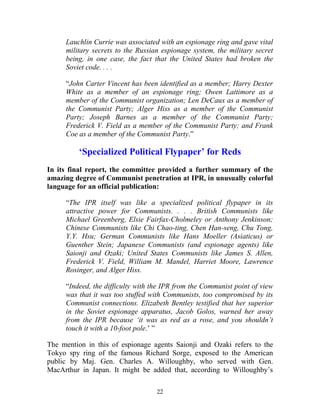
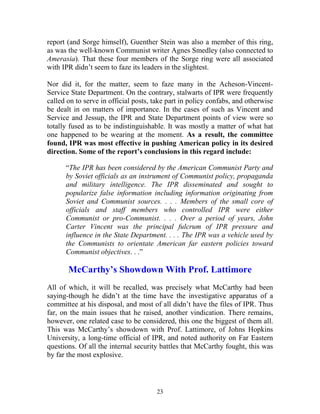
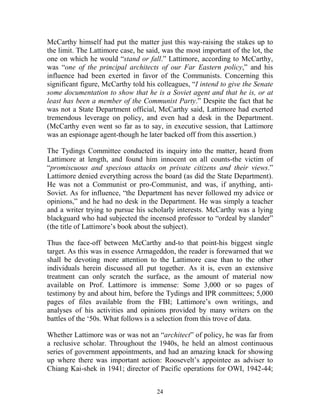
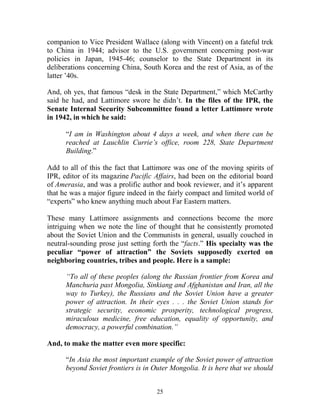
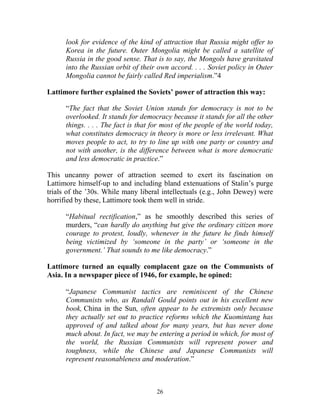
![27
Lattimore’s other stock-in-trade was “realism,” which translated into
recognizing not only the Communists’ “power of attraction,” but their power
in general. After the United States pulled the plug on Chiang in 1949,
Lattimore was a key figure at a State Department conference to decide what
should be done next (Marshall and Jessup were both in attendance). For this
conclave he laid out a whole scenario of “realistic” actions in the East,
extending to Korea, Japan, and Indochina. Among his suggestions:
“The type of policy expressed by support for Chiang Kai-shek has
done more harm than good to the United States. . . . [Red] China
cannot be economically coerced by such measures as cutting off
trade. . . . It is not possible to make Japan an instrument of American
policy. . . . Under the second alternative Japan can keep herself alive
by coming to terms economically and politically with her neighbors in
Asia, principally China. . . . South Korea is more of a liability than an
asset to the interests and policy of the United States.”
Lattimore would explain this policy paper-and expand further on his
thesis-in his testimony the following year before the Tydings panel,
saying:
“I warned that we cannot expect to succeed with little Chiang Kai-
sheks where we failed with the big Chiang Kai-shek. But we are still
supporting a little Chiang Kai-shek in South Korea and we have since
taken on another one in Indochina.”
Small wonder Joe McCarthy and others who watched the debacle of our
policy in China saw Lattimore as a big part of the problem. There was more
reason for concern, however, than the professor’s odd opinions. As it
happened, there were witnesses who came over from the Communist side
reporting that Lattimore had been made known to them as a member of the
apparatus.
Among these was Louis Budenz, formerly of the Daily Worker, who said his
superiors told him Lattimore was a Communist agent and should be given
appropriate editorial treatment. Not surprisingly, Lattimore devoted much of
his time on the witness stand to attacking Budenz as either a venal or a
psychotic liar.](https://image.slidesharecdn.com/mccarthyswaragainstcommunism-150816032113-lva1-app6892/85/Mccarthys-war-against-communism-27-320.jpg)
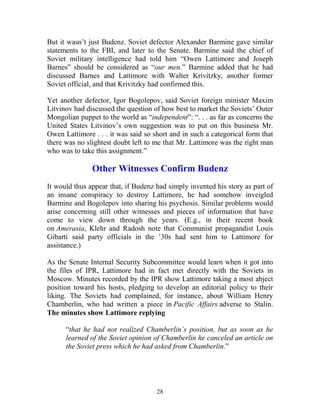
![29
Lattimore also asked the Soviets to contribute articles of their own
to Pacific Affairs, as this would help the magazine develop a definite
“line.” He said that
“if the Soviet group would show in their articles a general line-a
struggle for peace-the other articles would naturally gravitate to that
line.” He added that “he was willing to have P.A. reflect such a line,
but these positive articles must be started positively.” And again: “He
would like to meet the Soviet suggestions as far as possible, as to
having a more definite line expressed in P.A.”
Also emerging from the hearings, and other revelations since, are many
details concerning Lattimore’s choice of editors and writers.
His tastes in this regard-and in editorial style-were reflected in this
message to IPR official Edward Carter:
“. . . I think that you are pretty cagey in turning over so much of the
China section of the inquiry to Asiaticus, Han-seng and Chi [all
identified Communists]. They will bring out the absolutely essential
radical aspects, but can be depended on to do it with the right touch. .
. . For China, my hunch is that it will pay to keep behind the official
Chinese Communist position-far enough not to be covered by the
same label-but enough ahead of the active Chinese liberals to be
noticeable. . . . For the USSR-back their international policy in
general, but without using their slogans and above all without giving
them or anybody else an impression of subservience. . .”
As seen, this was the ostensibly objective style that Lattimore himself
adopted. The subservience to Moscow tended to show up more plainly in his
direct communication with the Kremlin and, it would appear, his hiring of
personnel. In a new study of U.S. policy in China, for instance, historian
Maochun Yu discusses the IPR employment of the Chinese Communist
Chen Han-Seng, as follows:
“Chen, a Comintern intelligence agent associated with Richard
Sorge’s spy ring in Shanghai and Tokyo, was dispatched by Moscow
to New York to aid Owen Lattimore in editing the journal Pacific
Affairs from 1936 to 1939.”](https://image.slidesharecdn.com/mccarthyswaragainstcommunism-150816032113-lva1-app6892/85/Mccarthys-war-against-communism-29-320.jpg)
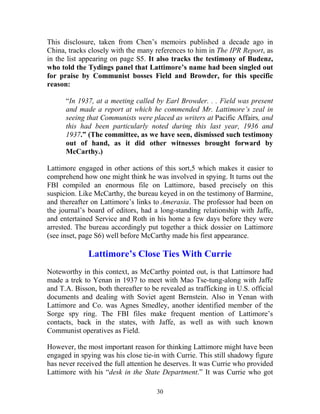
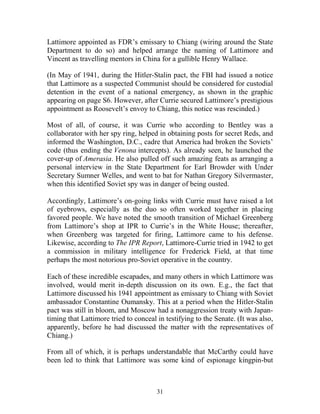
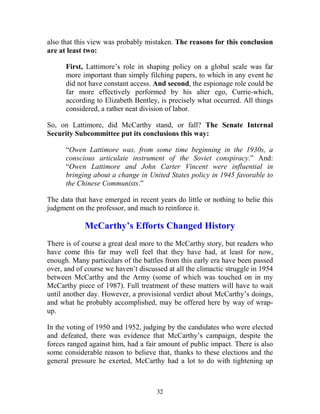
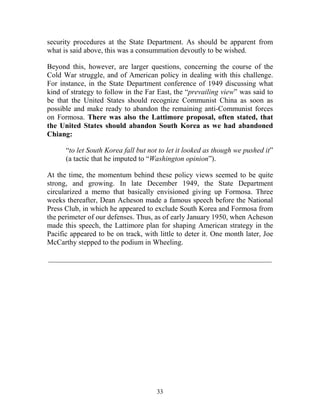
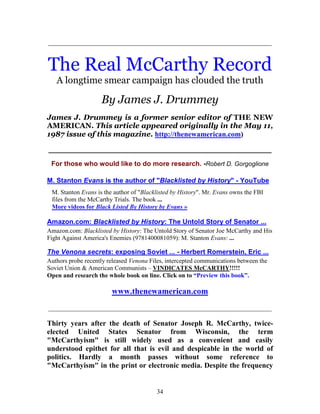
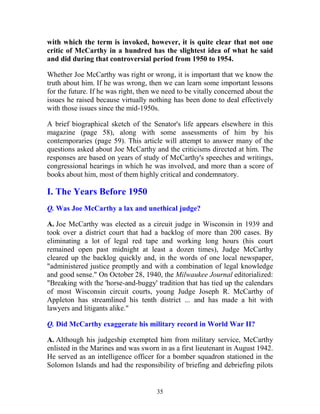
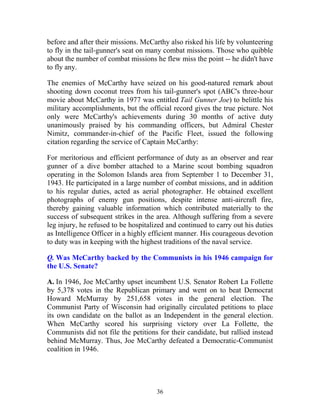
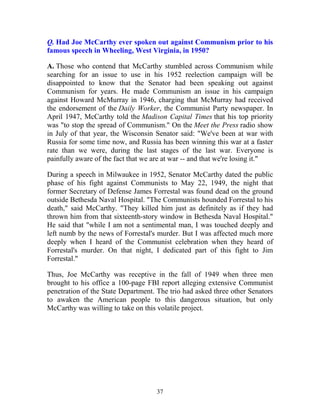
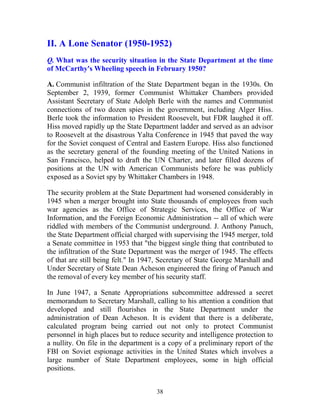
![39
The memorandum listed the names of nine of these State Department
officials and said that they were "only a few of the hundreds now employed
in varying capacities who are protected and allowed to remain despite the
fact that their presence is an obvious hazard to national security. There is
also the extensive employment in highly classified positions of admitted
homosexuals, who are historically known to be security risks." On June 24,
1947, Assistant Secretary of State John Peurifoy notified the chairman of the
Senate subcommittee that ten persons had been dismissed from the
department, five of whom had been listed in the memorandum. But from
June 1947 until McCarthy's speech in February 1950, the State Department
did not fire one person as a loyalty or security risk. In other branches of the
government, however, more than 300 persons were discharged for loyalty
reasons alone during the period from 1947 to 1951.
It was also during the mid-to-late Forties that Communist sympathizers in
the State Department played a key role in the subjugation of mainland China
by the Reds. "It is my judgment, and I was in the State Department at the
time," said former Ambassador William D. Pawley, "that this whole fiasco,
the loss of China and the subsequent difficulties with which the United
States has been faced, was the result of mistaken policy of Dean Acheson,
Phil Jessup, [Owen] Lattimore, John Carter Vincent, John Service, John
Davies, [O.E.] Clubb, and others." Asked if he thought the mistaken policy
was the result of "sincere mistakes of judgment," Pawley replied: "No, I
don't."
Q. Was Joe McCarthy the only member of Congress critical of those
whose policies had put 400 million Chinese into Communist slavery?
A. No, there were others who were equally disturbed. For instance, on
January 30, 1949, one year before McCarthy's Wheeling speech, a young
Congressman from Massachusetts deplored "the disasters befalling China
and the United States" and declared that "it is of the utmost importance that
we search out and spotlight those who must bear the responsibility for our
present predicament." The Congressman placed a major part of the blame on
"a sick Roosevelt," General George Marshall, and "our diplomats and their
advisors, the Lattimores and the Fairbanks," and he concluded: "This is the
tragic story of China whose freedom we once fought to preserve. What our
young men had saved, our diplomats and our President have frittered away."
The Congressman's name was John F. Kennedy.](https://image.slidesharecdn.com/mccarthyswaragainstcommunism-150816032113-lva1-app6892/85/Mccarthys-war-against-communism-39-320.jpg)
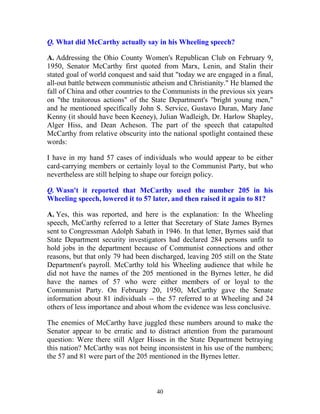
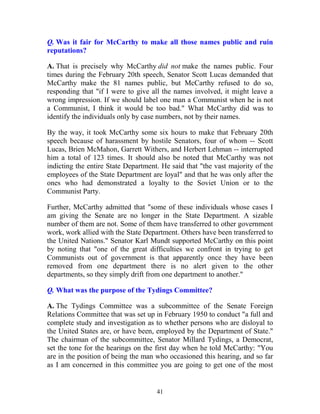
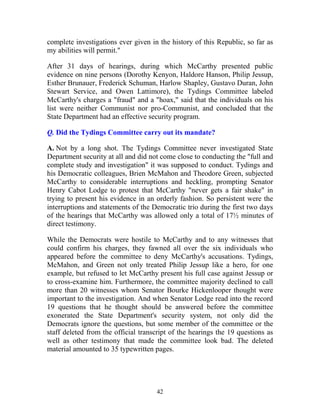
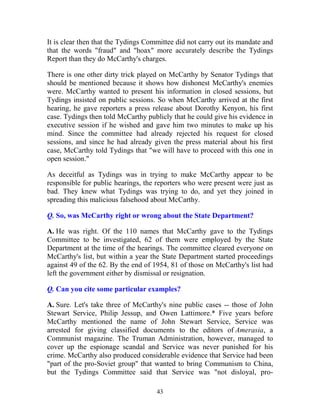
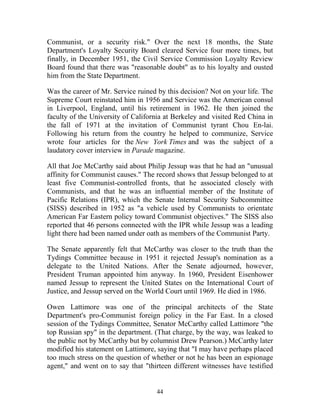
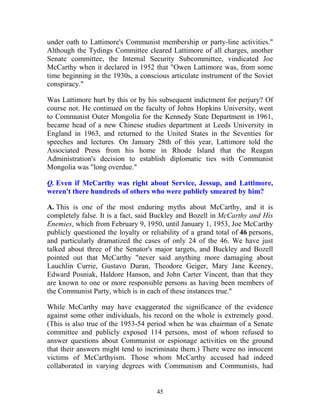
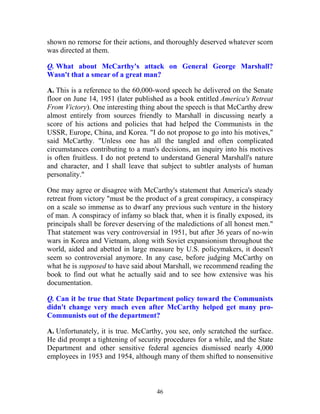
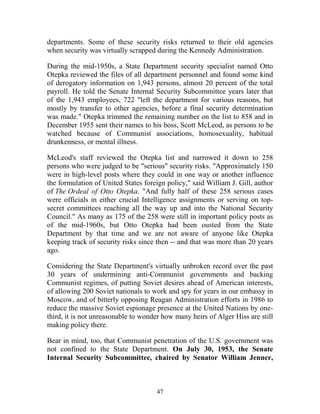
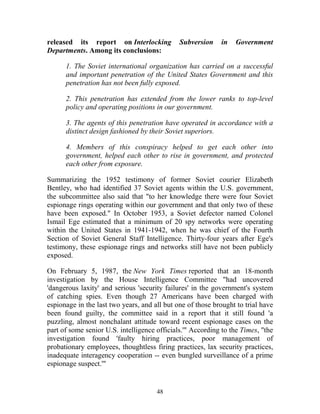
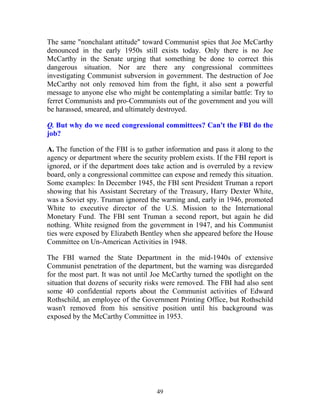


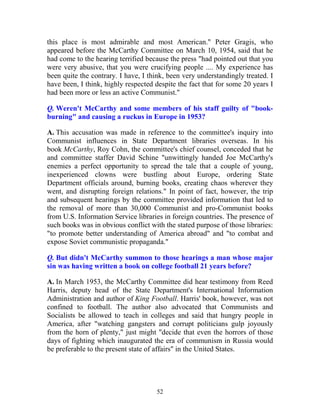
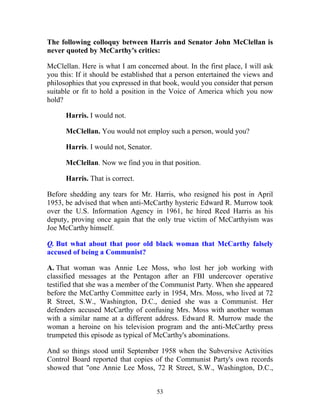
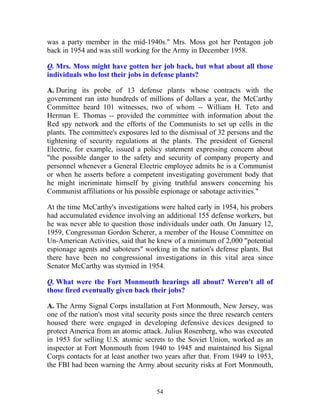

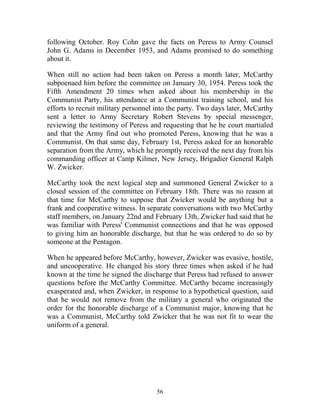
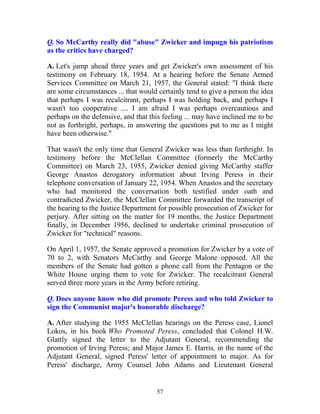
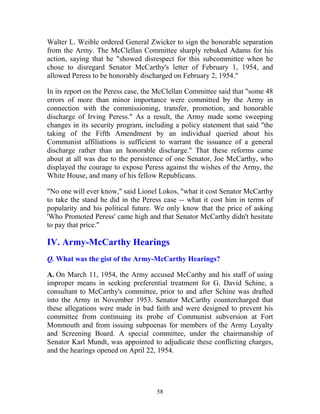
![59
The televised hearings lasted for 36 days and were viewed by an estimated
20 million people. After hearing 32 witnesses and two million words of
testimony, the committee concluded that McCarthy himself had not
exercised any improper influence in behalf of David Schine, but that Roy
Cohn, McCarthy's chief counsel, had engaged in some "unduly persistent or
aggressive efforts" in behalf of Schine. The committee also concluded that
Army Secretary Robert Stevens and Army Counsel John Adams "made
efforts to terminate or influence the investigation and hearings at Fort
Monmouth," and that Adams "made vigorous and diligent efforts" to block
subpoenas for members of the Army Loyalty and Screening Board "by
means of personal appeal to certain members of the [McCarthy] committee."
In a separate statement that concurred with the special committee report,
Senator Everett Dirksen demonstrated the weakness of the Army case by
noting that the Army did not make its charges public until eight months after
the first allegedly improper effort was made in behalf of Schine (July 1953),
and then not until after Senator McCarthy had made it known (January
1954) that he would subpoena members of the Army Loyalty and Screening
Board. Dirksen also called attention to a telephone conversation between
Secretary Stevens and Senator Stuart Symington on March 8, 1954, three
days before the Army allegations were made public. In that conversation,
Stevens said that any charges of improper influence by McCarthy's staff
"would prove to be very much exaggerated .... I am the Secretary and I have
had some talks with the [McCarthy] committee and the chairman, and so on,
and by and large as far as the treatment of me is concerned, I have no
personal complaint."
In his 1984 book Who Killed Joe McCarthy?, former Eisenhower White
House aide William Bragg Ewald Jr., who had access to many unpublished
papers and memos from persons involved in the Army-McCarthy clash,
confirms the good relations that existed between McCarthy and Stevens and
the lack of pressure from McCarthy in behalf of Schine. In a phone
conversation November 7, 1953, the Senator told the Secretary not to give
Schine any special treatment, such as putting him in the service and
assigning him back to the committee. McCarthy even said that Roy Cohn
had been "completely unreasonable" about Schine, that "he thinks Dave
should be a general and work from the penthouse of the Waldorf."
Ewald also reported a phone conversation between Stevens and Assistant
Secretary of Defense Fred Seaton on January 8, 1954, in which Stevens](https://image.slidesharecdn.com/mccarthyswaragainstcommunism-150816032113-lva1-app6892/85/Mccarthys-war-against-communism-59-320.jpg)
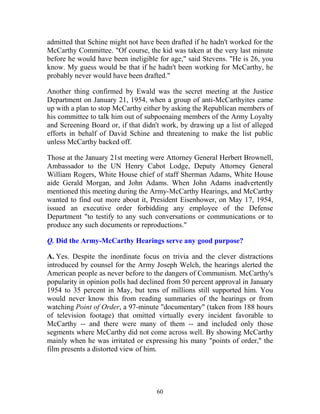
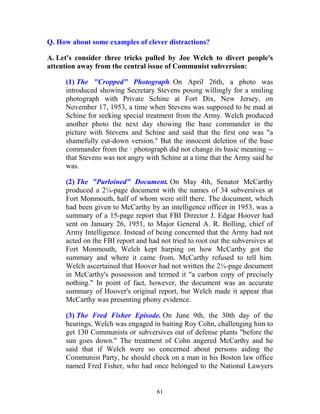
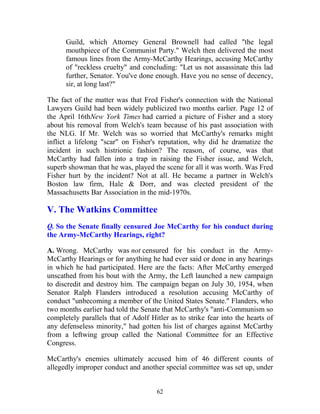
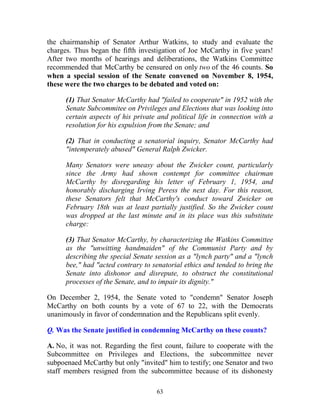
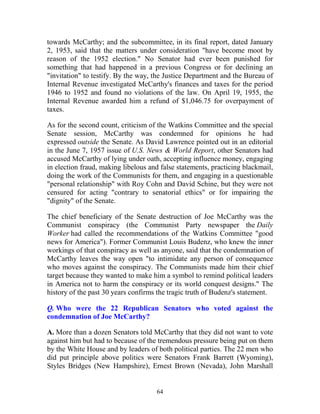

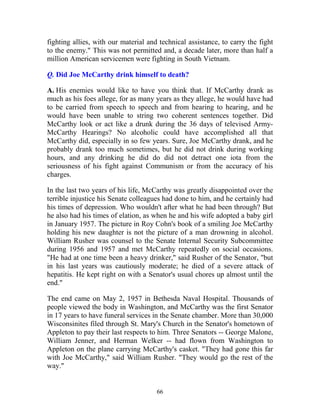



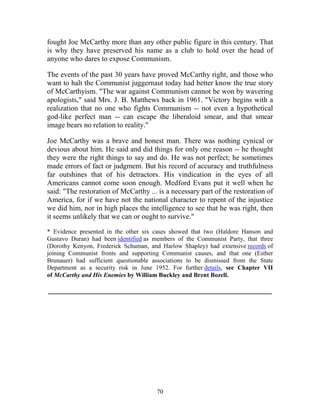

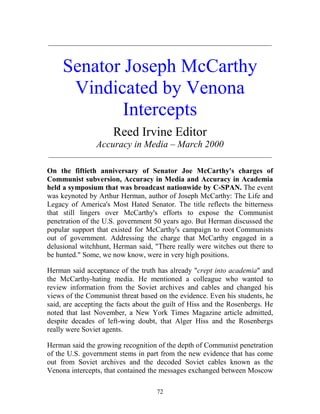
![73
and its illegal intelligence agents in the U.S. during World War II. Herman,
whose book confirms the essential accuracy of McCarthy's charges, now
finds himself in the cross-hairs, under assault by elements of the media and
academia. But he seemed confident that the New York Times and other
media would eventually accept the truth about McCarthy as well.
Herman said many of McCarthy's charges can now be seen as reasonable
and rational. And, equally important, they were seen that way at the time. He
said McCarthy, a Republican, struck a chord when he charged that the
Truman administration was failing to safeguard the national security of the
United States. But Herman said that when McCarthy extended these
criticisms to the Eisenhower Administration, he began losing support from
the public and his own party. For example, Herman said McCarthy
overreached in his criticisms of General George C. Marshall, who, as
Secretary of State, was accused of furthering the aims of the
Communists in the Soviet Union and China. Herman said Marshall was a
legitimate target of criticism by many in Congress, including Senator Robert
Taft, but that McCarthy carried the attack too far. [See page 84]
And while McCarthy can be criticized for his accusations against those who
facilitated the Communist takeover of China, Herman said scholars would be
well-advised not to focus on McCarthy's charges so much as the motives of
those he named. He wondered how so many seemingly smart people could
be taken in by the Communists or become their agents. Herman explained,
"The shift of focus has to come because now we really do understand
just how deep, how active and how prevalent that Soviet espionage
activity really had been."
Confessions of a Fellow Traveler
To make the point that the Communist influence in the government and
other institutions was greatly multiplied by sympathizers who could honestly
say that they were not members of the Communist Party or any of its
numerous fronts, AIM chairman Reed Irvine cited his own experience. He
said he came under the influence of a communist history teacher in high
school who introduced him to pro-Soviet publications. At the University of
Utah, he studied under leftist professors who steered him to such books as
Walter Duranty's I Write as I Please, which painted a rosy picture of the](https://image.slidesharecdn.com/mccarthyswaragainstcommunism-150816032113-lva1-app6892/85/Mccarthys-war-against-communism-73-320.jpg)

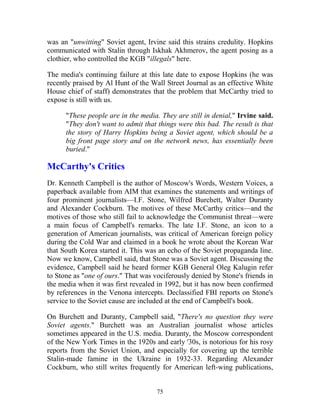
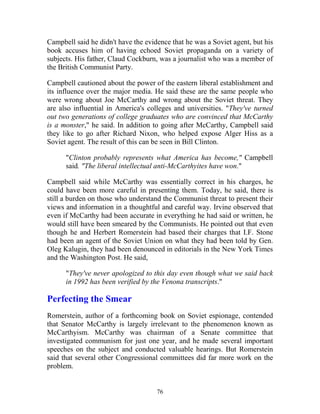
![77
Nevertheless, McCarthy was transformed into a demon by the Communists,
who were desperate to mislead the public about their efforts to penetrate the
U.S. government. Accusing McCarthy of making inaccurate or exaggerated
statements, they promoted the term "McCarthyism" in an effort to discredit
investigations into the Communist movement.
Romerstein, who worked in various capacities for the U.S. government for
about 25 years, specializing in the fields of internal security and intelligence,
still marvels at the ability of the Communists to make "McCarthyism" into a
phenomenon that lingers to this day. He found it significant that McCarthy is
still vilified while modern-day politicians, such as Vice President Al Gore,
get away with major gaffes and exaggerations on a regular basis. Romerstein
commented,
"Can you imagine an American politician today saying he invented
the Internet? Or that he and his wife were the subject of the book Love
Story? Or that he discovered Love Canal? No politician would ever
do that or say that—unless you're Al Gore of course. But you don't
hear anything about Goreism. You hear about McCarthyism."
Romerstein said the term "McCarthyism" appeared in the title of a 1951
booklet written by a top Communist Party member which attacked both
Trumanism and McCarthyism. Harry Truman was President at the time and
his administration had the power to weed the Communists out of the
government. Romerstein said Truman was more of a threat to the
Communists than Joe McCarthy ever was, but he didn't want Republicans in
Congress, including McCarthy, to make hay out of the issue of Communist
penetration of the government. He told his staff that Alger Hiss was "guilty
as hell," but he told the press that the charges against him were a red herring.
He explained to his staff that he didn't want to say anything that would help
the Republicans. [According to numerous historical facts, Truman
supported and facilitated Gen. George Marshall’s betrayal of our
World War II Ally, Gen Chiang Kai-shek and his Nationalist
Government of free China. Truman was no more a threat to the
communist than Joseph Stalin!]
Romerstein said that a high level member of the Communist Party, who
wrote a booklet in which he attacked both "Trumanism" and "McCarthyism,"
was severely criticized and expelled from the party over this. The leaders
wanted to focus on "McCarthyism" as the term to use to smear those who](https://image.slidesharecdn.com/mccarthyswaragainstcommunism-150816032113-lva1-app6892/85/Mccarthys-war-against-communism-77-320.jpg)
![78
were exposing Communists in government. They believed that coupling it
with "Trumanism" would weaken the chances of popularizing
"McCarthyism."
Smearing Joe McCarthy
Dan Flynn, executive director of Accuracy in Academia, described the
lengths to which the media went to destroy McCarthy. McCarthy's tax
returns were illegally made public by journalists, he said, and columnist
Drew Pearson placed a paid spy in the Senator's office. Journalists Ronald
May and Jack Anderson were accused of manufacturing quotes to make
McCarthy look bad. But the most outrageous ploy was the plan by the
Washington Post to publish a series of articles that included the charge that
McCarthy and his aides were stockpiling weapons in the basement of the
Senate, apparently in preparation for a possible coup. Democratic Party
leaders had paid a man named Paul Hughes more than $10,000 [About
$200,000 today] for the information and the Post was prepared to publish it
until, at the last minute, Hughes was exposed as a con man.
Dan Flynn said a major turning point was a series of reports by Edward R.
Murrow of CBS News attacking McCarthy. One of the most damaging was a
Murrow attack on McCarthy for charging that Annie Lee Moss, a clerk in
the Army code room, was a Communist. Murrow has now been shown to
have been completely off-base. Communist Party records show that
McCarthy was absolutely correct in identifying Moss as a Communist.
Naming Names
Veteran journalist M. Stanton Evans, who is writing his own book on
McCarthy, said one of the most notorious myths is that the Wisconsin
Senator had no names of suspected Communists in the State Department
when he gave his famous speech charging that there were 59 (according to
McCarthy himself) of them. Holding up a sheaf of papers, Evans said,
"Here are the names. Right here. Anybody who wants to can look at them."
He produced a letter that McCarthy sent to Senator Millard Tydings in 1950
in which he listed the 59 names, plus 22 others.
Evans said the original list identified the suspected Communists by number,
not by name, giving a brief description of each. He said it had been compiled
by Congressional staffers from the files of the State Department itself. In his](https://image.slidesharecdn.com/mccarthyswaragainstcommunism-150816032113-lva1-app6892/85/Mccarthys-war-against-communism-78-320.jpg)
![79
letter to Sen. Tydings, McCarthy attached the names to the numbers. Critics
have said over the years that the list was outdated, blown out of proportion,
that the individuals named were cleared by Congressional committees, or
that the people were just mildly leftist. But none of that was true. Evans
quoted from some of those cases: "...he furnished material to a known Soviet
espionage agent..." and "...He is a known Communist Party member."
Evans said the claim that these cases had been cleared by Congressional
hearings was a big falsehood. The chairman of one committee said the
information showed
"a large number of Communists on the rolls of the State Department,"
adding, "It makes me wonder if there is any representation of the
United States in the State Department."
McCarthy also had very revealing information about the Amerasia case. This
involved John Stewart Service, a Foreign Service officer who had been
stationed in China, who was arrested for passing classified information to
Philip Jaffe, the editor of Amerasia, a Communist magazine. In a major
speech, McCarthy charged that the Justice Department failure to prosecute
the case was a massive cover-up. "We now know that he was 100 percent
correct," Evans said. The FBI wiretapped the meeting where the cover-up
was arranged to get Service off. Laughlin Currie, an adviser to President
Roosevelt and a known Soviet agent, was involved in this. The Tydings
Committee said it could find nothing incriminating in the FBI files of
McCarthy target Owen Lattimore, a key adviser to the State Department.
Evans read from Lattimore's FBI file. It said in 1941 that Lattimore was a
Communist who should be detained in the event of a national emergency.
Currie, Service and Lattimore were all players in a conspiracy that engaged
in espionage for the Communists and manipulated U.S. policy to their
benefit. They maneuvered to cut off aid to the Chinese Nationalists in order
to help Mao win control of China [which was supported by Pres.
Truman]. Their efforts succeeded and the Nationalists fled to Taiwan in
1949. We and the Chinese have paid dearly for this betrayal.
Pseudo History
John Earl Haynes, who with Harvey Klehr has written two books on
Moscow's ties to the Communist Party USA (CPUSA), told the conference
that many historians are still reluctant to face the truth about the CPUSA. He](https://image.slidesharecdn.com/mccarthyswaragainstcommunism-150816032113-lva1-app6892/85/Mccarthys-war-against-communism-79-320.jpg)
![80
said the reigning orthodoxy in academia is that the CPUSA was a domestic
movement independent of Moscow. Haynes said the academic consensus is
wrong. After the [orchestrated] Soviet Union collapsed and the Soviet
Communist archives were opened for study, the hard truth started coming
out. Haynes, who traveled to Moscow to study the archives, says the
evidence clearly shows that the Soviets financially subsidized the CPUSA,
and that the party operated an underground apparatus that was tied to Soviet
intelligence [KGB] and influenced U.S. Government policy.
Haynes said there were some favorable reviews in the mainstream press of
their first book, The Secret World of American Communism, but the reaction
in journals of history was negative, even vicious. In one case, a reviewer
said Haynes and Klehr had mistranslated a key word in a Russian document
which the reviewer hadn't actually seen. When Haynes proved that his
translation was correct, the reviewer never conceded error. "Being in the
hard left in the academic world is never having to say you're sorry," he said.
Haynes said the truth of this book, based on Soviet archives, has been
confirmed by the release of the Venona transcripts, which show that about
350 Americans [that they know of] conspired with or spied for Moscow.
Haynes said many of them were members of the CPUSA, whose leaders
cooperated with Soviet intelligence. The transcripts confirm that several
large Soviet spy rings were operating throughout the U.S. government, and
that the members included Laughlin Currie, an adviser to FDR, and Harry
Dexter White, assistant secretary of the Treasury.
Several other books have been published over the last several years
confirming the existence of this Soviet espionage apparatus. Still, Haynes
said that some historians dismiss the evidence as insignificant or irrelevant.
Haynes commented that this proves that "the human mind is capable of
looking at something and not seeing anything at all."
He said that one historian, Jim Ryan of Texas A&M University, had
changed his own view about the CPUSA being an Americanized movement
after examining the evidence. But another, Eric Foner of Colombia
University, has refused to acknowledge the new evidence. Foner's 1999
book, The Story of American Freedom, still portrays the CPUSA in the
1930s, when it functioned as a mouthpiece for Stalin, as pro-freedom and
pro-democracy.](https://image.slidesharecdn.com/mccarthyswaragainstcommunism-150816032113-lva1-app6892/85/Mccarthys-war-against-communism-80-320.jpg)
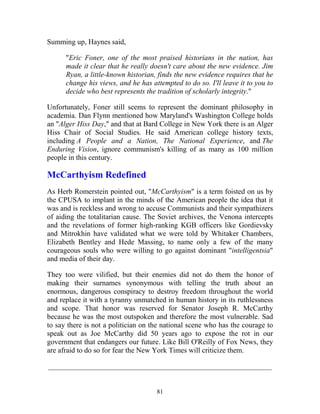
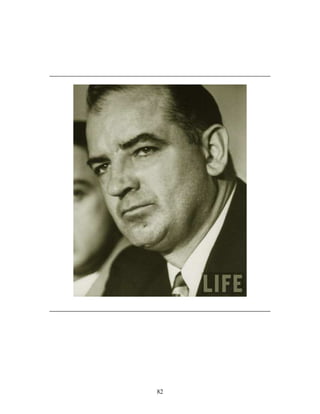
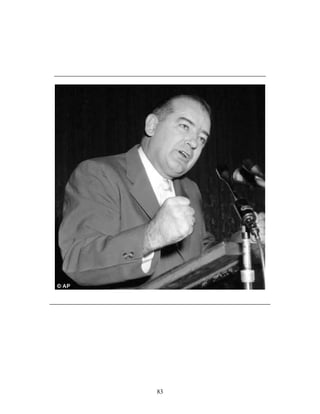

![85
disclosed it from all the sources available and all of them friendly. This grim
and solitary man it was who, early in World War II, determined to put his
impress upon our global strategy, political and military.
It was Marshall, who, amid the din for a "second front now" from every
voice of Soviet inspiration, sought to compel the British to invade across the
Channel in the fall of 1942 upon penalty of our quitting the war in Europe.
It was Marshall who, after North Africa had been secured, took the strategic
direction of the war out of Roosevelt's hands and - who fought the British
desire, shared by Mark Clark, to advance from Italy into the eastern plains of
Europe ahead of the Russians.
It was a Marshall-sponsored memorandum, advising appeasement of Russia
in Europe and the enticement of Russia into the far-eastern war, circulated at
Quebec, which foreshadowed our whole course at Tehran, at Yalta, and until
now in the Far East.
It was Marshall who, at Tehran, made common cause with Stalin on the
strategy of the war in Europe and marched side by side with him thereafter.
It was Marshall who enjoined his chief of military mission in Moscow under
no circumstances to "irritate" the Russians by asking them questions about
their forces, their weapons, and their plans, while at the same time opening
our schools, factories, and gradually our secrets to them in this count.
It was Marshall who, as Hanson Baldwin asserts, himself referring only to
the "military authorities," prevented us having a corridor to Berlin. So it was
with the capture and occupation of Berlin and Prague ahead of the Russians.
It was Marshall who sent Deane [Acheson] to Moscow to collaborate with
Harriman in drafting the terms of the wholly unnecessary bribe paid to Stalin
at Yalta. It was Marshall, with Hiss at his elbow and doing the physical
drafting of agreements at Yalta, who ignored the contrary advice of his
senior, Admiral Leahy, and of MacArthur and Nimitz in regard to the folly
of a major land invasion of Japan; who submitted intelligence reports which
suppressed more truthful estimates in order to support his argument, and
who finally induced Roosevelt to bring Russia into the Japanese war with a
bribe that reinstated Russia in its pre-1904 imperialistic position in
Manchuria-an act which, in effect, signed the death warrant of the Republic
of China.](https://image.slidesharecdn.com/mccarthyswaragainstcommunism-150816032113-lva1-app6892/85/Mccarthys-war-against-communism-85-320.jpg)
![86
It was Marshall, with [Dean] Acheson and Vincent eagerly assisting, who
created the China policy which, destroying China, robbed us of a great and
friendly ally, a buffer against the Soviet imperialism with which we are now
at war.
It was Marshall who, after long conferences with Acheson and Vincent,
went to China to execute the criminal folly of the disastrous Marshall
mission.
It was Marshall who, upon returning from a diplomatic defeat for the United
States at Moscow, besought the reinstatement of forty millions in lend-lease
for Russia.
It was Marshall who, for 2 years suppressed General Wedemeyer's report,
which is a direct and comprehensive repudiation of the Marshall policy.
It was Marshall who, disregarding Wedemeyer's advices on the urgent need
for military supplies, the likelihood of China's defeat without ammunition
and equipment, and our "moral obligation" to furnish them, proposed
instead a relief bill bare of military support.
It was the State Department under Marshall, with the wholehearted support
of Michael Lee and Remington in the Commerce Department that sabotaged
the $125,000,000 military-aid bill to China in 1947.
It was Marshall who fixed the dividing line for Korea along the thirty-eighth
parallel, a line historically chosen by Russia to mark its sphere of interest in
Korea.
It is Marshall's strategy for Korea which has turned that war into a pointless
slaughter, reversing the dictum of Von Clausewitz and every military
theorist since him that the object of a war is not merely to kill but to impose
your will on the enemy.
It is Marshall-Acheson strategy for Europe to build the defense of Europe
solely around the Atlantic Pact nations, excluding the two great wells of
anti-Communist manpower in Western Germany and Spain and spurning the
organized armies of Greece and Turkey-another case of following the
Lattimore advice of "let them fall but don't let it appear that we pushed
them."](https://image.slidesharecdn.com/mccarthyswaragainstcommunism-150816032113-lva1-app6892/85/Mccarthys-war-against-communism-86-320.jpg)
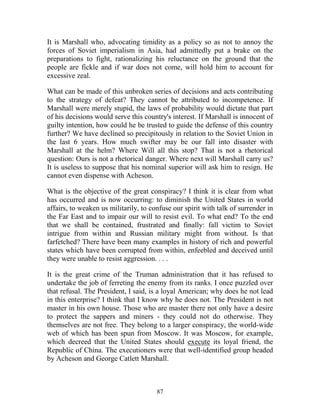
![88
How, if they would, can they break these ties, how to return to simple
allegiance to their native land? Can men sullied by their long and dreadful
record afford us leadership in the world struggle with the enemy? How can a
man whose every important act for years had contributed to the prosperity of
the enemy reverse himself? The reasons for his past actions are immaterial.
Regardless of why he has done what he did, he has done it and the
momentum of that course bears him onward. . . .
The time has come to halt this tepid, milk-and-water acquiescence which a
discredited administration, ruled by disloyalty, sends down to us. The
American may belong to an old culture, he may be beset by enemies here
and abroad, he may be distracted by the many words of counsel that assail
him by day and night, but he is nobody's fool. The time has come for us to
realize that the people who sent us here expect more than time-serving from
us. The American who has never known defeat in war, does not expect to be
again sold down the river in Asia. He does not want that kind of betrayal. He
has had betrayal enough. He has never failed to fight for his liberties since
George Washington rode to Boston in 1775 to put himself at the head of a
band of rebels unversed in war. He is fighting tonight, fighting gloriously in
a war [Korea] on a distant American frontier made inglorious by the men he
can no longer trust at the head of our affairs.
The America that I know, and that other Senators know, this vast and
teeming and beautiful land, this hopeful society where the poor share the
table of the rich as never before in history, where men of all colors, of all
faiths, are brothers as never before in history, where great deeds have been
done and great deeds are yet to be done, that America deserves to be led not
to humiliation or defeat, but to victory.
The Congress of the United States is the people's last hope, a free and open
forum of the people's representatives. We felt the pulse of the people's
response to the return of MacArthur. We know what it meant. The people,
no longer trusting their executive, turn to us, asking that we reassert the
constitutional prerogative of the Congress to declare the policy for the
United States.
The time has come to reassert that prerogative, to oversee the conduct of this
war, to declare that this body must have the final word on the disposition of
Formosa and Korea. They fell from the grasp of the Japanese empire through
our military endeavors, pursuant to a declaration of war made by the](https://image.slidesharecdn.com/mccarthyswaragainstcommunism-150816032113-lva1-app6892/85/Mccarthys-war-against-communism-88-320.jpg)
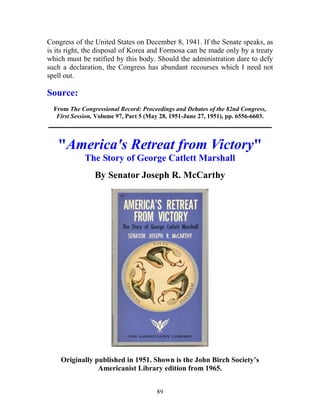
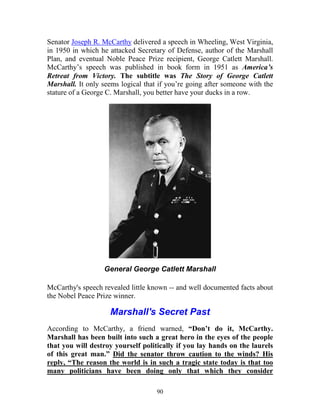
![91
politically wise --- only that which is safe for their own political
fortunes.” McCarthy pressed ahead, encouraged by a 1943 article in the
New York Times magazine by Sidney Shalett. Shalett quotes Marshall as
having said, “No publicity will do me no harm, but some publicity will do
me no good.” McCarthy says in the book/speech, “This perhaps is why
Marshall stands alone among the wartime leaders in that he has never
[as of June 1951] written his own memoirs or allowed anyone else to
write his story for him.” [One must ask himself, WHY?]
McCarthyism in action!
From one of the hearings of the Senate Permanent Subcommittee on
Investigations
Thorough Research
Throughout America’s Retreat from Victory the reader will notice that
McCarthy makes most of his more noteworthy (alarming/controversial)
points by quoting other authors. Under the heading of “Source Material”,
Appendix A lists more than two dozen bibliographical references from
such noteworthy authors as Winston Churchill, General Omar Bradley
and General Claire Chennault. Also quoted are a State Department White
Paper and several congressional hearings. Magazine and newspaper articles
are named and cited by author in the text as is a book written by the subjects
own wife. Mrs. George C. Marshall penned a quasi-biography in 1946,
Together, from which McCarthy quotes to confirm an incident in 1933
involving her husband’s career.](https://image.slidesharecdn.com/mccarthyswaragainstcommunism-150816032113-lva1-app6892/85/Mccarthys-war-against-communism-91-320.jpg)

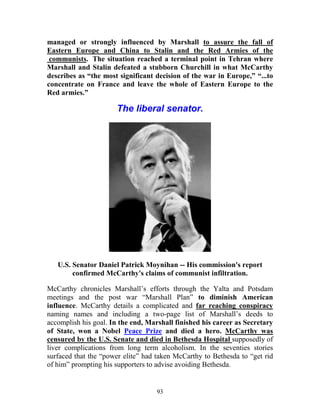
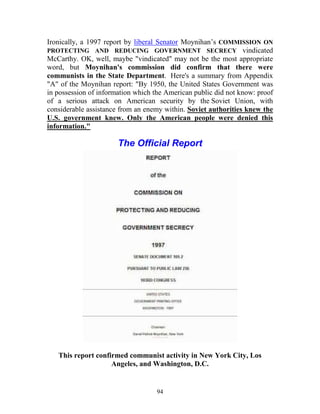
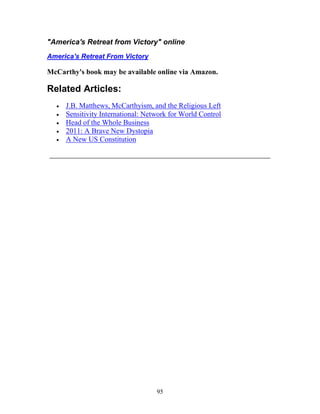
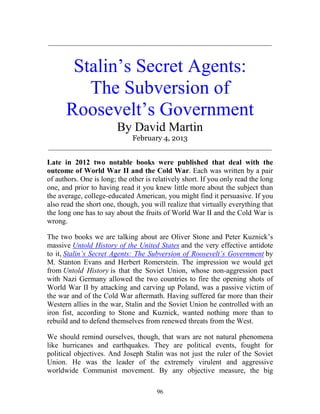

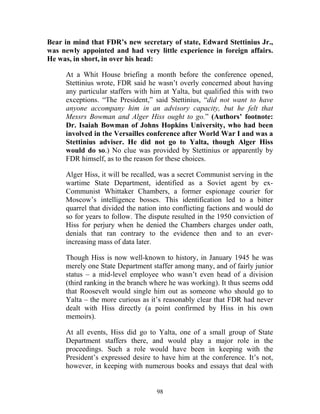
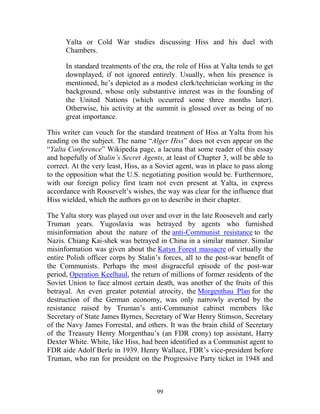
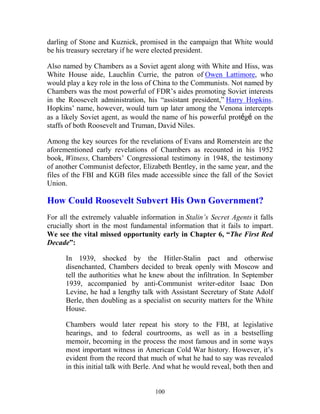
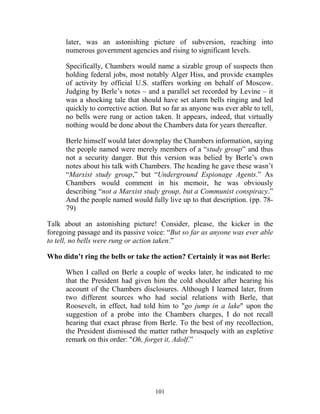

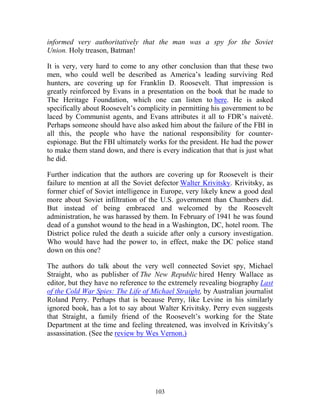
![104
Another Look at Harry Hopkins
Had the authors not neglected to tell us that Berle had fully briefed FDR in
1939 on the Soviet infiltration of his government, we would read the entire
book in a different light, but particularly their Chapter 9, “Friends in High
Places.” That chapter talks about Harry Hopkins, Lauchlin Currie, and
David Niles, all members of the White House staff. Roosevelt had been
informed by Berle that Currie was a Soviet agent. Neither Hopkins nor Niles
had been named by Chambers (Niles was not yet in the White House), but
Hopkins was so aggressively pro-Soviet and pro-Stalin that one has to
wonder how FDR could not have known what would later be indicated by
the Venona intercepts and by Soviet defectors. To their credit, in Chapter 9
the authors reveal virtually all the evidence that I have in “Harry Hopkins
Hosted Soviet Spy Cell” that Hopkins was a Soviet agent. Unfortunately,
they don’t include what is fresh and new in that article, that is, the fact that
he hosted that spy cell while he was working at Roosevelt’s right hand. It’s a
shame, because it would have strengthened their argument considerably.
Hopkins, like Alger Hiss, was also a very important figure in the sell-out
to Stalin and world Communism at Yalta. The following passage is
particularly revealing:
Hopkins’s pro-Soviet leanings would be on further display in the
Yalta records, where his handwritten comments are available for
viewing. Though seriously ill at the time of the meeting, he continued
to ply his influence with FDR, who himself was mortally sick and
susceptible to suggestion in ways that we can only guess at. After
FDR had made innumerable concessions to Stalin, there occurred a
deadlock on the issue of “reparations.” At this point, Hopkins
passed a note to Roosevelt that summed up the American attitude
at Yalta. “Mr. President,” this said, “the Russians have given in so
much at this conference I don’t think we should let them down. Let the
British disagree if they want – and continue their disagreement at
Moscow [in subsequent diplomatic meetings]” (Emphasis added by
Evans and Romerstein).
One may search the Yalta records at length and have trouble finding
an issue of substance on which the Soviets had “given in” to FDR –
the entire thrust of the conference, as Roosevelt loyalist [Robert]
Sherwood acknowledged, being in the reverse direction.](https://image.slidesharecdn.com/mccarthyswaragainstcommunism-150816032113-lva1-app6892/85/Mccarthys-war-against-communism-104-320.jpg)
![105
It was certainly very late in the day by that point, but FDR for a long time
had every reason to know what he was getting from his principal aide
Hopkins.
The Tell-Tale Media Role
Chapter 11 is promisingly titled “The Media Megaphone.” Unfortunately,
we get only a pecking around the periphery of the sell-out to the Soviet
Union during the Roosevelt era. We learn that I.F. Stone with his I.F.
Stone’s Weekly was a Soviet agent and that two of the staffers for one of
Oliver Stone’s heroes, columnist Drew Pearson, were Communist agents,
those being the disreputable David Karr and Andrew Older. Karr was also a
speech writer for Henry Wallace. We also learn a little bit about Communist
propagandists like Edgar Snow, who was even able to get published in the
generally conservative pages of the Saturday Evening Post.
“His most famous journalistic effort, and basis for his reputation, was
his 1938 book, Red Star Over China, which was for the most part an
unabashed commercial on behalf of the Communist Mao Tse-tung.”
They also tell us about Michael Straight and his New Republic and remind us
of the selling job for Stalin that the infamous Walter Duranty had done in the
pages of The New York Times.
When Evans and Romerstein talk about Duranty, though, they are even
easier on those to whom he reported than they are on the man to whom
Hopkins, Currie, and Niles reported:
Duranty arrived in Russia in August 1921, at the same time
as [Armand] Hammer, and over the next decade would establish
himself as the dean of Western journalists in the country. After a brief
early period of hostility, he would experience a complete conversion
and become an avid promoter of the Soviet system. Why he did so is
uncertain. It doesn’t appear he was an ideological Communist, as he
reportedly had no ideology at all beyond a kind of Nietzschean will-
to-power view that didn’t mind dictators and apparently hardened him
to scenes of suffering. This would have been useful emotional armor
in the Soviet Union in the 1930s, when the suffering was intense and
would get more so. (p. 73)](https://image.slidesharecdn.com/mccarthyswaragainstcommunism-150816032113-lva1-app6892/85/Mccarthys-war-against-communism-105-320.jpg)
![106
What motivated Duranty? Perhaps Dr. James Mace can clear things up
for us a little:
In the 1980s during the course of my own research on
the Ukrainian Holodomor [famine] I came across a most interesting
document in the U.S. National Archives, a memorandum from one
A.W. Kliefoth of the U.S. Embassy in Berlin dated June 4, 1931.
Duranty dropped in to renew his passport. Mr. Kliefoth thought it
might be of possible interest to the State Department that this
journalist, in whose reporting so much credence was placed, had told
him that, " 'in agreement with The New York Times and the Soviet
authorities,' his official dispatches always reflect the official opinion
of the Soviet government and not his own."
Note that the American consular official thought it particularly
important for his superiors that the phrase, in agreement with The
New York Times and the Soviet authorities, was a direct quotation.
This was precisely the sort of journalistic integrity that was awarded
the Pulitzer Prize in 1932. – "A Tale of Two Journalists: Walter
Duranty, Gareth Jones, and the Pulitzer Prize," Ukraine List 203,
July 15, 2003.
What a novel idea? Walter Duranty, like Harry Hopkins, Lauchlin Currie,
and David Niles, was doing just what his boss expected him to do, or what
their mutual bosses expected them to do. Were they so inclined, the authors
could have done a much better job of informing their readers had they
availed themselves of this writer’s “The New York Times and Joseph Stalin.”
They could also have benefitted from reference to Freda Utley’s The China
Story and Joseph Keeley’s The China Lobby Man: The Story of Alfred
Kohlberg. Evans and Romerstein talk about the influence of the Communist
infiltrated Institute of Pacific Relations. But had they referenced these
books, they would have permitted us to see the powerful role that The
New York Times and the New York Herald Tribune played in spreading
pro-Communist IPR propaganda:
Both Freda Utley and Joseph Keeley, the author of the Kohlberg
biography, stress the near monopoly the IPR and their pro-Communist
friends had over the book publishing and reviewing industry in the
United States as it related to China in the critical period of the 1940s.](https://image.slidesharecdn.com/mccarthyswaragainstcommunism-150816032113-lva1-app6892/85/Mccarthys-war-against-communism-106-320.jpg)

![108
Dall maintained a family loyalty but could not avoid several
disheartening conclusions in his book [FDR: My Exploited Father-in-
Law, 1970]. He portrays the legendary president not as a leader but as
a “quarterback” with little actual power. The “coaching staff”
consisted of a coterie of handlers (“advisers” like Louis Howe,
Bernard Baruch and Harry Hopkins) who represented the international
banking cartel. For Dall, FDR ultimately was a traitor manipulated by
“World Money” and motivated by conceit and personal ambition.
In that picture, big media with The New York Times in the forefront during
the Roosevelt-Truman years, may be likened to members of the coaching
staff. But all of them hearken to the voice of the team owner or owners, the
international banking cartel. They had financed the Bolsheviks and they
were still promoting their interests until the propaganda bubble began to
burst, starting with the testimony of Elizabeth Bentley.
Evans and Romerstein’s little book has been very well received
Taking Stock
. Of the eight customers who have reviewed it so far on Amazon.com, six
have given it the maximum of five stars. The other two gave it four. But
one of the five-star reviewers, Jerry Cooper of Napa, California,
captures the prevailing situation well with his lead-off:
Unfortunately, this book will likely only be read by those [who are]
already somewhat knowledgeable as to its shocking contents. I doubt
if it will end up on many university recommended reading lists. As a
result, many students of history will be woefully lacking in their
understanding of World War II and the Cold War Era. This book is
one of a handful of those must-reads exposing a scandal of epic
proportions. Without this missing piece of the puzzle post-WWII
history is inexplicable.
Mr. Cooper and his co-readers of the book are no doubt all wringing their
hands in frustration. At the same time, the big pro-Communist propaganda
work by Stone and Kuznick, which came out only two weeks before Stalin’s
Secret Agents, has had 135 customer reviews, with almost as high an
average favorable rating. As we note in “Oliver Stone and the Japanese
Surrender,” the book has had a little bit of help. We had thought that for the](https://image.slidesharecdn.com/mccarthyswaragainstcommunism-150816032113-lva1-app6892/85/Mccarthys-war-against-communism-108-320.jpg)


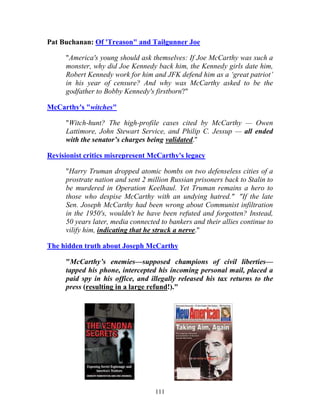
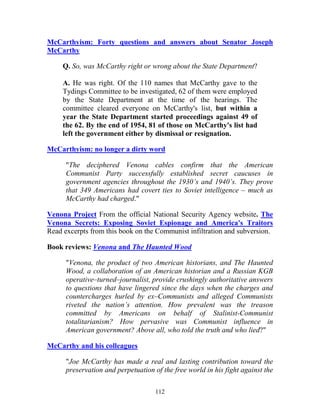
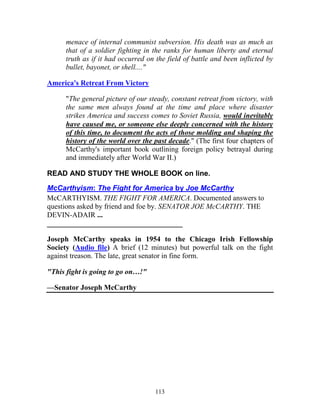


![116
Some McCarthy Mistakes [NOBODY is perfect!!!]
Stan Evans does not shy from acknowledging McCarthy’s mistakes. The
senator, he says, was “a flawed champion” of his cause, adding,
“It would have been better had he been less impulsive, more nuanced,
more subtle in his judgments. On the other hand, somebody more
nuanced and refined would not have dreamed of grappling with the
forces deployed against him.”
Whatever his faults, in the author’s verdict, McCarthy “was a good man and
true.”
The media’s role in tilting the scales against the most controversial United
States senator in the 20th Century began the very moment he burst on the
national scene in February of 1950.
In nearly every previous book about McCarthy, including President Dwight
Eisenhower’s memoirs, the story is told that the Wisconsin senator falsely
stated in a Lincoln Day Republican speech in Wheeling, West Virginia that
he had a list of 205 Communists who were then working in the State
Department. McCarthy insisted he actually had said at Wheeling that he did
indeed have a list. But a list of 57 in the State Department “who were either
card-carrying Communists or certainly loyal to the Communist Party.”
A local reporter meeting McCarthy at the Wheeling airport asked for and got
a draft of the speech which included the “205” figure, but two witnesses
swore that the senator warned Frank Desmond of the Wheeling Intelligencer
that the speech was a preliminary draft and would be extensively revised
before delivery. Desmond ran with the “205” version anyway and it was
picked up by the AP.
The widely disseminated report that attributed the “205” figure to McCarthy
was later discredited by congressional investigators dispatched twice to
Wheeling. They effectively backed McCarthy’s version (A tape of the
speech has not survived). That has not deterred newspapers, broadcasters,
and biased or lazy “historians” from repeating it without doing the necessary
fact-checking. Certainly a classic validation that truth rarely catches up with
widely disseminated lies.](https://image.slidesharecdn.com/mccarthyswaragainstcommunism-150816032113-lva1-app6892/85/Mccarthys-war-against-communism-116-320.jpg)
![117
How did the “205” figure make its way even to the rough draft of the
speech? In a two-hour interview with AIM, Evans explained that McCarthy
was getting “bits and pieces” of information in real time from several
investigations by congressional committees, the FBI, the Justice Department,
and the State Department itself. The State department cover-up allowed
Communists to “resign” with no stigma, only to pop up later in other
government positions.
The Facts
From the get-go, the media-abetting political firestorm over such side issues
as what McCarthy said or did not say at Wheeling tended (not accidentally)
to obscure the substance of what he was saying.
Media errors on McCarthy abound, even on such basics as which body of
Congress of which he was a member. Evans identifies the Los Angeles
Times, and the Washington Post as having carried articles mentioning
“Senator Joe McCarthy’s House Un-American Activities Committee.
[HUAC]” One, McCarthy was a senator, never a member of the House.
No senator can be a member of a House committee, let alone chairman
of it. Two, if writers for the “prestige” media don’t know that Congress
is a bicameral legislature, how can we expect them to understand much
else, including the difference between 205 and 57?
Even the popular TV show “Touched by an Angel” in 1997 ran an episode
imputing the Hollywood “blacklist” of Communist actors (portrayed as
innocents) to HUAC which it was implied was run by Joe McCarthy.
The New York Times (the “newspaper of record”) ran an obituary on an 88-
year old professor named Oscar Shaftel who had refused to answer questions
about Communist connections by “the Senate Internal Security
Subcommittee headed by Senator Joseph R. McCarthy.” The reality: That
panel was headed by Senator William Jenner, not by McCarthy whose
Senate Permanent Subcommittee on Investigations had nothing to do
with Shaftel.
After Evans persisted for six weeks (to no avail) in demanding that the
Times do a correction, he went to AIM founder Reed Irvine, who wrote
directly to the Times publisher Arthur Sulzberger Sr. That did the trick.](https://image.slidesharecdn.com/mccarthyswaragainstcommunism-150816032113-lva1-app6892/85/Mccarthys-war-against-communism-117-320.jpg)

![119
Lee Moss. This despite the fact that Moss had been identified by
undercover operative Markward as a member of the Communist Party
of the District of Columbia. The FBI had become concerned that Moss had
suddenly been shifted to the position of code clerk for the Army Signal
Corps. McCarthy’s not illogical question: Why would an Army cafeteria
worker be a Communist with no known background in this highly sensitive
work be offered that job seemingly out of the blue? This came to
McCarthy’s attention when his panel was probing the remnants of the (Julius
and Ethel) Rosenberg spy ring at Ft. Monmouth, where lax security
procedures remained after the Rosenbergs were executed.
Evans notes that neither in the 2005 George Clooney film “Good Night and
Good Luck,” nor in the original 1954 Ed Murrow presentation is any
evidence cited to indicate that Mrs. Moss was an innocent victim. In
Murrow’s case, the failure to tell the whole story might have been more
excusable since many facts in the case were not publicly known then,
“though had Murrow and Co. been the crack journalists they professed to
be, they could have dug out the facts” from hearing transcripts.
“In the case of the Clooney film, there is no excuse whatever, as the
truth about the case is fully available to anyone who bothers to review
the SACB [Subversive Activities Control Board] reports and archives
of [the FBI],” writes the author.
Clooney even admits he knew Annie Lee Moss was a Communist. The
issue, he insists, was that “she has a right to face her accuser.”
“If Clooney was indeed aware of the copious evidence on the case, as
he should have been in presuming to inform the world about it, he
certainly disguised this knowledge in his movie,” Evans retorts.
Evans’ intrepid shoe-leather sleuthing unearthed an FBI report showing
that days before the Senate hearing shown in the Murrow/Clooney
shows, the Bureau had fully briefed the Democrats on McCarthy’s
committee that Annie Lee Moss was in fact a Communist. Yet these
same committee Democrats sympathized with her at McCarthy’s
expense. Evans says by then, committee Democrats were aiding the
Eisenhower administration’s effort to bring down Senator McCarthy.
Eisenhower was surrounded by elitists and Wall-Streeters who played on the](https://image.slidesharecdn.com/mccarthyswaragainstcommunism-150816032113-lva1-app6892/85/Mccarthys-war-against-communism-119-320.jpg)

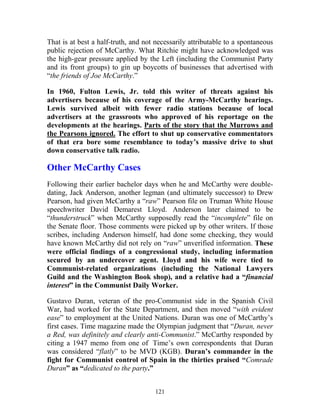
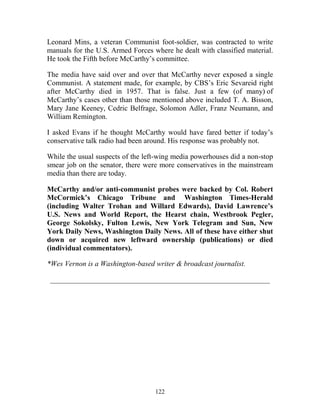





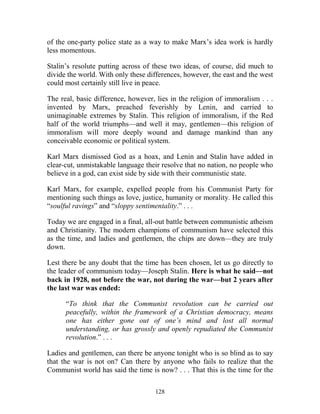
![129
show-down between the democratic Christian world and the communistic
atheistic world?
Unless we face this fact, we shall pay the price that must be paid by those
who wait too long.
Six years ago, . . . there was within the Soviet orbit, 180,000,000 people.
Lined up on the antitotalitarian side there were in the world at that time,
roughly 1,625,000,000 people. Today, only six years later, there are
800,000,000 people under the absolute domination of Soviet Russia—an
increase of over 400 percent. On our side, the figure has shrunk to around
500,000,000. In other words, in less than six years, the odds have changed
from 9 to 1 in our favor to 8 to 5 against us.
This indicates the swiftness of the tempo of Communist victories and
American defeats in the cold war. As one of our outstanding historical
figures once said, “When a great democracy [A Republic] is destroyed, it
will not be from enemies from without, but rather because of enemies from
within.” . . .
The reason why we find ourselves in a position of impotency is not because
our only powerful potential enemy has sent men to invade our shores . . . but
rather because of the traitorous actions of those who have been treated so
well by this Nation. It has not been the less fortunate, or members of
minority groups who have been traitorous to this Nation, but rather those
who have had all the benefits that the wealthiest Nation on earth has had to
offer . . . the finest homes, the finest college education and the finest jobs in
government we can give.
This is glaringly true in the State Department. There the bright young men
who are born with silver spoons in their mouths are the ones who have been
most traitorous. . . .
I have here in my hand a list of 205 . . . a list of names that were made
known to the Secretary of State as being members of the Communist Party
and who nevertheless are still working and shaping policy in the State
Department. . . .
As you know, very recently the Secretary of State proclaimed his loyalty to a
man guilty of what has always been considered as the most abominable of](https://image.slidesharecdn.com/mccarthyswaragainstcommunism-150816032113-lva1-app6892/85/Mccarthys-war-against-communism-129-320.jpg)








![138
…[M]any of you have been engaged in this all-out fight against communism
long before I came on the scene. You have been engaged in what may well
be the final Armageddon foretold in the Bible-that struggle between good
and evil, between life and death, if you please.
At the start, let me make clear that in my opinion no special credit is due
those of us who are making an all-out fight against this Godless force-a force
which seeks to destroy all the honesty and decency that every Protestant,
Jew and Catholic has been taught at his mother’s knee. It is a task for which
we can claim no special credit for doing. It is one which we are obligated to
perform. It is one of the tasks for which we were brought into this world-for
which we were born. If we fail to use all the powers of mind and body which
God gave us, then I am sure our mothers, wherever they are tonight, may
well sorrow for the day of our birth…
We know that the major aim of communism, as stated by its atheistic leaders
more than 30 years ago, is to create a Red China, thence a Red Asia, wash it
with a Red Pacific-and then enslave America.
In this connection let us take a look at the magnitude of Russian success and
the enormity of our disaster in China. This is the disaster to which Mr.
Acheson refers as the dawning of a new day; the disaster to which Mr.
[Owen] Lattimore [an East Asia scholar at Johns Hopkins University] refers
as a “limitless horizon of hope.”
For whom is Mr. Acheson’s new day dawning? Who faces Lattimore’s
limitless horizon of hope? Not China. Not the forces of democracy in
America, but the military masters of the Soviet Union.
The question in the mind of a man elected to represent the people of this
Nation and indirectly the people of the world is. Why is this so?
Is it because we are less intelligent than the Communists? Is it because we
can’t match them in courage? Is it because their devotion to atheism is
greater than our devotion to God? Is it because we are less willing to stand
up and fight for what we think is right? Ladies and gentlemen, the answer to
all those questions is “No.” Then what is the answer? Is it in our leadership?
To that my answer is “Yes,” and I challenge anyone to find another answer.](https://image.slidesharecdn.com/mccarthyswaragainstcommunism-150816032113-lva1-app6892/85/Mccarthys-war-against-communism-138-320.jpg)




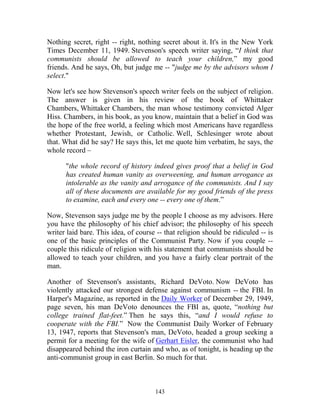

![145
statement that his recommendations were followed in Italy. When Truman
was before a crowd in -- in New York -- thank you -- New York on
Columbus day, and he confirmed the fact that Stevenson's the man who, as
he said, sowed the seeds for the immediate postwar policy in
Italy. Well, General Bedell Smith, a fine American, in his testimony and in
his book, has told what that foreign policy established by Stevenson
was. And listen to this if you will, he says that foreign policy, here's his
testimony, page 35 and 37, he says that foreign policy was, to connive -- "to
connive to bring communists into the Italian government and to bring the
Italian communist leader, Togliatti, back from Moscow.”
You get the picture of that my friends? Stevenson says, “I was the man who
formulated the policy.” Truman says, yes he did. And the head of the Central
Intelligence Agency says the policy then was “to connive to put communists
into the Italian government” -- connive, and to bring [Toggliatti], the
communist leader, back from Moscow, which they did. Keep in mind that
Bedall Smith had nothing to do with this program; he was just testifying as
to what it was.
Now I know -- I know that one of the defense -- defenses of this will be
raised by the Stevenson camp tomorrow will be that, well, Eisenhower was
in charge of the European military forces of that time. But Stevenson knows;
his camp followers know; you know and I know that Eisenhower had
nothing to do with formulating State Department policy. He had the task --
He had the task of winning the war in Europe with the loss of the smallest
amount of bloodshed and lives and he did that job very well.
Now let -- let us pick-- let us pick another piece of the jigsaw puzzle of
Stevenson's history. On September 23rd of this year, Admiral Staton, who
was a holder of the Medal of Honor, signed a statement for us; signed a
statement covering his experience with Stevenson after he, Staton, had been
assigned to the task of enforcing public law 151 and order -- and removing
the communists from the radios aboard our ships.
Well Stevenson was a special assistant at that time, in the Navy
Department. He called Admiral Staton to his office and here's the affidavit
given to us by Staton about that meeting. Hasn't been used until tonight. Let
me read just one paragraph from it. He says,](https://image.slidesharecdn.com/mccarthyswaragainstcommunism-150816032113-lva1-app6892/85/Mccarthys-war-against-communism-145-320.jpg)



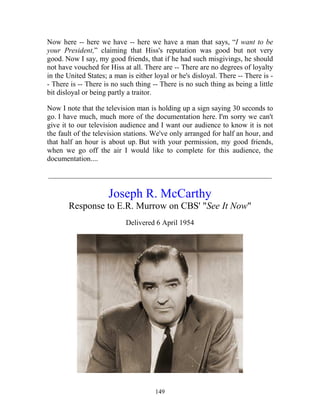
![150
Edward R. Murrow: One month ago tonight we presented a report on
Senator Joseph R. McCarthy. We labeled it as controversial. Most of that
report consisted of words and pictures of the Senator. At that time we said,
"If the Senator believes we have done violence to his words or pictures, if he
desires to speak to answer himself, an opportunity will be afforded him on
this program. The Senator sought the opportunity, asked for a delay of three
weeks because he said he was very busy and he wished adequate time to
prepare his reply. We agreed. We supplied the Senator with a kinescope of
that program of March 9, and with such scripts and recordings as he
requested. We placed no restrictions upon the manner or method of the
presentation of his reply, and we suggested that we would not take time to
comment on this particular program. The Senator chose to make his reply on
film. Here, now, is Senator Joseph R. McCarthy, junior Senator from
Wisconsin.
Joseph McCarthy: Good evening. Mr. Edward R. Murrow, Educational
Director of the Columbia Broadcasting System, devoted his program to an
attack on the work of the United States Senate Investigating Committee, and
on me personally as its chairman. Now over the past four years he has made
repeated attacks upon me and those fighting Communists.
Now, of course, neither Joe McCarthy nor Edward R. Murrow is of any
great importance as individuals. We are only important in our relation to the
great struggle to preserve our American liberties. The Senate Investigating
Committee has forced out of government, and out of important defense
plants, Communists engaged in the Soviet conspiracy. And you know it's
interesting to note that the viciousness of Murrow's attacks is in direct ratio
to our success in digging out Communists.
Now, ordinarily -- ordinarily, I would not take time out from the important
work at hand to answer Murrow. However, in this case I feel justified in
doing so because Murrow is a symbol, a leader, and the cleverest of the
jackal pack which is always found at the throat of anyone who dares to
expose individual Communists and traitors. I am compelled by the facts to
say to you that Mr. Edward R. Murrow, as far back as twenty years ago, was
engaged in propaganda for Communist causes. For example, the Institute of
International Education, of which he was the Acting Director, was chosen to
act as a representative by a Soviet agency to do a job which would normally
be done by the Russian Secret Police [The KGB]. Mr. Murrow sponsored a
Communist school in Moscow. In the selection of American students and](https://image.slidesharecdn.com/mccarthyswaragainstcommunism-150816032113-lva1-app6892/85/Mccarthys-war-against-communism-150-320.jpg)
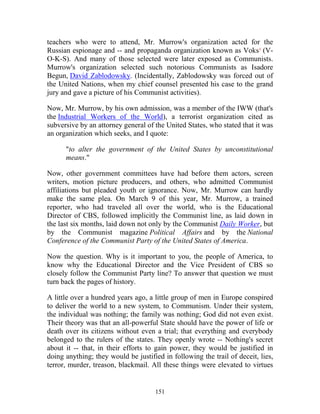
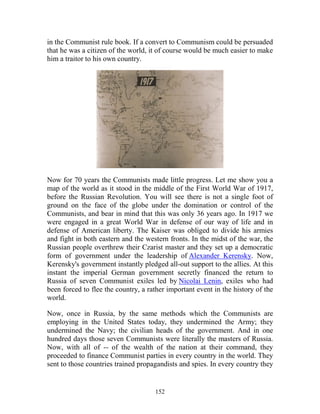
![153
of course had to find glib, clever men like Edward R. Murrow who would
sponsor invitations to students and teachers to attend indoctrinational
schools in Moscow, exactly as Murrow has done. They trained Communists
in every country in the world. Their sole purpose was [to] infiltrate the
government, and once Communists were in government they in turn brought
others in.
Now let us look at the map of the world as it was twenty years ago. At that
time there was one country with 180,000,000 people in Communist chains.
Now let us look at a map of the world as of tonight, this 6th day of April,
nineteen hundred and fifty-four. Over one-third of the earth's area under
Communist control and 800,000,000 people in Communist chains, in
addition to the 800,000,000 in Communist chains in Europe and Asia.
Finally, the Communists have gained a foothold and a potential military base](https://image.slidesharecdn.com/mccarthyswaragainstcommunism-150816032113-lva1-app6892/85/Mccarthys-war-against-communism-153-320.jpg)
![154
here in our half of the world, in Guatemala, with the Communists seeping
down into the Honduras. My good friends, how much of this was achieved
by military force and how much was achieved by traitors and Communist-
line propagandists in our own government and in other free governments?
Let's start in Europe, if we may. They took by military force a little piece of
Finland. In the same way they took three small Baltic states: Latvia,
Lithuania, and Estonia. They took half of Poland in the same way. They
acquired the rest of Poland through Polish traitors and Communists in our
own government, who gave American dollars and American support to the
Communists in Poland. They took over Romania, Bulgaria, and Hungary,
without firing a single shot. They did this by the infiltration of Communists
in key spots in the governments. The Communists took over Czechoslovakia
without firing a shot. This they did by the infiltration of Communists into the
Czechoslovakian government also. And listen to what a high official in the
anti-Communist government of Czechoslovakia had to say about the
Communist enslavement of Czechoslovakia. Here's what he said. He said,
In my country, the pattern was identical to what it is in the United
States [today]. If anyone, before the Communists took over, dared to
attack those Communists who were preparing and shaping the policy
of my government, shaping the policy to betray my people, he was
promptly attacked and destroyed by a combination of Communists,
fellow travelers and those unthinking people who thought they were
serving the cause of liberalism and progress, but who were actually
serving the cause of the most reactionary credo of all times,
Communism.
Still quoting: "Because of those people, night has fallen upon my nation and
slavery upon my people."
Now, shifting to another area of the world, to the East, how about this vast
land area and the teeming masses of China? Let's just take a look at that
map, ² if you please. Keep in mind that a few short years ago China was a
free nation, friendly to the United States. Now, were the --were -- let's take a
look at that map. Were those 400,000,000 Chinese captured by force of
arms? Certainly not. They were delivered -- delivered to Communist slave
masters by the jackal pack of Communist-line propagandists, including the
friends of Mr. Edward R. Murrow, who day after day shouted to the world](https://image.slidesharecdn.com/mccarthyswaragainstcommunism-150816032113-lva1-app6892/85/Mccarthys-war-against-communism-154-320.jpg)
![155
that the Chinese Communists were agrarian reformers, and that our ally, the
Republic of China, represented everything that was evil and wicked.
Now my good friends, if there were no Communists in our government,
would we have consented to and connived to turn over all of our Chinese
friends to the Russians? Now my good friends, if there had been no
Communists in our government, would we have rewarded them with all of
Manchuria, half of the Kurile Islands and one-half of Korea? Now how
many Americans -- how many Americans have died and will die because of
this sell-out to Communist Russia? God only knows.
If there were no Communists in our government, why did we delay for 18
months, delay our research on the hydrogen bomb, even though our
intelligence agencies were reporting day after day that the Russians were
feverishly pushing their development of the H-bomb? And may I say to
America tonight that our nation may well die -- our nation may well die --
because of that 18-months deliberate delay. And I ask you, who caused it?
Was it loyal Americans? Or was it traitors in our government?
It is often said by the left wing that it is sufficient to fight Communism in
Europe and Asia, but that Communism is not a domestic American issue.
But the record, my good friends, is that the damage has been done by
cleverly calculated subversion at home, and not from abroad. It is this
problem of -- of subversion that our Committee faces.
Now let us very quickly glance at some of the work of our Committee, some
of the work it's done in slightly over a year's time. For example, 238
witnesses were examined in public session; 367 witnesses examined in
executive session; 84 witnesses refused to testify as to Communist activities
on the ground that, if they told the truth, they might go to jail; 24 witnesses
with Communist backgrounds have been discharged from jobs [in] which
they were handling secret, top-secret, confidential material, individuals who
were exposed before our Committee.
Of course you can't measure the success of a committee by a box score,
based on the number of Communist heads that have rolled from secret jobs.
It is completely impossible to even estimate the -- the effect on our
government of the day-to-day plodding exposure of Communists. And that
is, of course, why the Murrows bleed. For example, the exposure of only one
Fifth Amendment Communist in the Government Printing Office, an office](https://image.slidesharecdn.com/mccarthyswaragainstcommunism-150816032113-lva1-app6892/85/Mccarthys-war-against-communism-155-320.jpg)
![156
having access to secret material from almost every government agency,
resulted in an undisclosed number of suspensions. It resulted in the removal
of the Loyalty Board, and the revamping of all the royal -- of the loyalty
rules, so that we do have apparently a good, tight loyalty set up in the
Printing Office at this time. Also disclosure of Communists in the military
and in the radar laboratories resulted in the abolition of the Pentagon board
which had cleared and ordered reinstated Communists who had for years
been handling government secrets. Also, as a result of those hearings, Army
orders have been issued to prevent a recurrence of the Major [Irving] Peress
scandal, which was exposed by the Committee. Now to attempt to evaluate
the effect of the work of an investigating committee would be about as
impossible as to attempt to evaluate the effect of well-trained watchdogs
upon the activities of potential burglars.
We Americans live in a free world, a world where we can stand as
individuals, where we can go to the church of our own choice and worship
God as we please, each in his own fashion, where we can freely speak our
opinions on any subject, or on any man. Now whether -- whether we -- we
shall continue to so live has come to issue now. We will soon know whether
we are going to go on living that kind of life, or whether we are going to live
the kind of life that 800,000,000 slaves live under Communist domination.
The issue is simple. It is the issue of life or death for our civilization.
Now Mr. Murrow said on this program -- and I quote -- he said:
"The actions of the junior Senator from Wisconsin have given
considerable comfort to the enemy."
That is the language of our statute of treason -- rather strong language. If I
am giving comfort to our enemies, I ought not to be in the Senate. If, on the
other hand, Mr. Murrow is giving comfort to our enemies, he ought not to be
brought into the homes of millions of Americans by the Columbia
Broadcasting System.
Now this is a question which can be resolved with very little difficulty. What
do the Communists think of me? And what do the Communists think of Mr.
Murrow? One of us is on the side of the Communists; the other is against the
Communists, against Communist slavery.
Now the Communists have three official publications in America, and these
are not ordinary publications. They have been officially determined to be the](https://image.slidesharecdn.com/mccarthyswaragainstcommunism-150816032113-lva1-app6892/85/Mccarthys-war-against-communism-156-320.jpg)
![157
transmission belts through which Communists in America are instructed as
to the party-line, or the position which Communist writers and playwrights
must take -- also, of course, telecasters, broadcasters. The first of these is a
booklet which I would like to show you, if I may. It's entitled "The Main
Report,"³ delivered at the National Conference of the Communist Party of
the U.S.A. -- published in New York in October, 1953. The report states,
quote:
"The struggle against McCarthyism is developing currently along the
following main line" -- Keep in mind this is a Communist
publication giving instructions to members of the Party -- "along
the following main line: the struggle against witch hunting, the
struggle against investigations of the McCarthy/McCarran type, and
defense of the victims of McCarthyism such as Owen Lattimore, etc.
In addition there is the direct attack on McCarthy."
Let me ask you, does that sound somewhat like the program of Edward R.
Murrow of March 9 over this same station?
Now in this -- in this report, the Communists do not hesitate to instruct -- to
instruct the comrades that their fight on McCarthy is only a means to a larger
end. Again, let me quote from the instructions from the Communist Party to
its membership, on page 33, I quote:
Our main task is to mobilize the masses for the defeat of the foreign
and domestic policy of the Eisenhower Administration and for the
defeat of the Eisenhower regime itself. The struggle against
McCarthyism contributes to this general objective.
Just one more quotation, if I may, from page 31 of these instructions of the
Communist Party to its members, and I quote: "Since the elections,
McCarthyism has emerged as a menace of major proportions." I think
maybe we know what the Communist Party means by "a menace of major
proportions." They mean a menace of major proportions to the Communist
Party [and its goals and objectives].
Now let's take 30 seconds or so, if we may, to look a little further to see
who's giving comfort to our enemies. Here is a Communist Daily Worker of
March 9, containing seven articles and a principal editorial, all attacking
McCarthy. And the same issue lists Mr. Murrow's program as -- listen to this
-- "One of tonight's best bets on TV." And then -- just one more -- here's the](https://image.slidesharecdn.com/mccarthyswaragainstcommunism-150816032113-lva1-app6892/85/Mccarthys-war-against-communism-157-320.jpg)

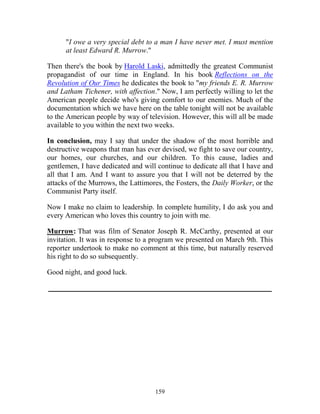

![161
_____________________________________________________________
Sen. McCarthy Pins Mayor Brunton Over Red Links
www.arcataeye.com/.../sen-mccarthy-pins-mayor-brunton-over-red-links...
Mayor Shawn Brunton and Sen. Joseph McCarthy gesture vigorously during
Senate hearings. PHOTO APPROVED BY FEDERAL BUREAU OF
INVESTIGATION [FBI]
Mayor Brunton hunkers down in the face of
Sen. McCarthy’s interrogation.
_____________________________________________________________](https://image.slidesharecdn.com/mccarthyswaragainstcommunism-150816032113-lva1-app6892/85/Mccarthys-war-against-communism-161-320.jpg)
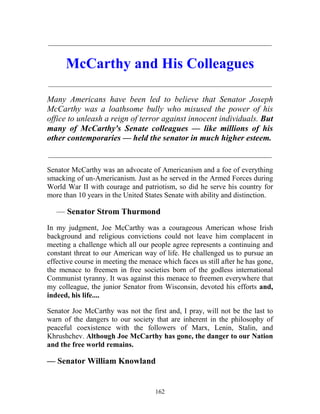


![165
I know I have not been alone in reflecting upon what might have been done
to ward off the unhappy event which climaxed Senator McCarthy's crusade
against communism. Here was a man who was hated and vilified, not for
his faults, but for his virtues. Nevertheless, he insisted on standing the
savage ordeal alone. He did not want his friends to be tarred and
feathered by the brush that was being prepared for him.
— Senator John Bricker
Joe McCarthy had a cause. The cause was this Republic and its perpetuity.
That was what impelled him onward. What he did was voluntary; he did not
have to do it. He did not have to accept "the slings and arrows of outrageous
fortune," as Shakespeare has put it. He could have coasted; he could have
been a conformist; he could have kept his eye always on his constituency
and the next election. But he was not impelled to do that....
I have often wondered whether I would have done what Joe McCarthy did. I
have some doubt about it. I think in moments I would have quailed. I am
afraid that in moments when the load became so heavy and the fury so great,
I might have faltered. He did not falter under any attack. He did not
falter under any assault of character which was made upon him, day
after day. He had the courage to withstand the attacks. He excelled in
the human attributes of loyalty and devotion to his country, and had the
courage to express and articulate his devotion in everyday life.
— Senator Everett Dirksen
Do not mourn Joe McCarthy. Be thankful that he lived, at the right time, and
according to the talents vested in him by his Maker.
Be grateful, too, that when it came his time to die, he passed on with the
full assurance that, because he lived, America is a brighter, safer, more
vigilant land today [In 1957.]
—Senator Barry Goldwater
All quotations in this column appear in a book entitled Joseph Raymond
McCarthy, Late a Senator from Wisconsin, Memorial Addresses Delivered
in Congress, published by the U.S. government printing office in 1957.
_____________________________________________________________](https://image.slidesharecdn.com/mccarthyswaragainstcommunism-150816032113-lva1-app6892/85/Mccarthys-war-against-communism-165-320.jpg)




![170
One desired investigation that never got started was that of the
Central Intelligence Agency, headed by Allen W. Dulles. Our staff
had been accumulating extensive data about its operations and
McCarthy was convinced that an inquiry was overdue.
Our files contained allegations gathered from various sources
indicating that the CIA had unwittingly hired a large number of
double agents — individuals who, although working for the CIA, were
actually Communist agents whose mission was to plant inaccurate
data.…
…although we spent far more for intelligence than other countries,
the quality of the information we were receiving was so poor that at
times the CIA found out what was happening only when it read the
newspapers.…
When the news broke out that McCarthy was contemplating an
inquiry into the CIA, consternation reigned at 1600 Pennsylvania
Avenue [the White House]. Vice-President Nixon was assigned to
the delicate job of blocking it.13
Block it Nixon did, and no outside investigation of spies in the CIA has
ever been held. The consequences were obvious. Even the
Eisenhower administration was forced to admit in 1954 that CIA
intelligence measures against the Soviet Bloc had been a dismal
failure.14
Since the end of World War II and continuing to this day, the
United States has never been able to infiltrate the KGB or recruit
double agents of any significance.
But the final proof of massive Soviet penetration emerged during the
1960s, with the spectacular defection of the highest-level KGB officer
ever to reach the West.
The Golitsyn Coup
Anatoliy Golitsyn, a Ukrainian born in 1926, joined the Communist Party
of the Soviet Union in 1945 as he prepared to become a military officer. He
began several years of training in intelligence and acquired a position in
the KGB by 1948. By the early 1950s, he had risen to an important
enough position to co-author a plan for restructuring Soviet intelligence,](https://image.slidesharecdn.com/mccarthyswaragainstcommunism-150816032113-lva1-app6892/85/Mccarthys-war-against-communism-170-320.jpg)






![177
The KGB underwent the largest and most important rearrangement.
Not only did its counterintelligence directorate expand, but a special
top-secret new “inner level” was created to coordinate strategic
deception. Known as Department D, it was immediately staffed with some
fifty or sixty intelligence specialists, all highly experienced and trusted
officers of the Soviet secret police. These men had special access to the
highest state secrets, and were given the authority to coordinate the most
powerful agencies of the Soviet government. Department D was designed to
be the high command of the Communist disinformation campaign.
This “inner” KGB has remained so secret that no Soviet defector, other than
Golitsyn, has known of its existence. Golitsyn himself was not a member
of it, but he was intimately involved in creating it. In 1952 to 1953, he
had been appointed to a small team of experts who planned the restructuring
of the KGB; Golitsyn’s plan was adopted by Shelepin in 1959, by which
time the 32-year-old Golitsyn was studying at the KGB Institute in Moscow
— and therefore was privy to the details of the KGB reorganization.
Later that year, Golitsyn helped implement the deception strategy as a
new senior analyst in the KGB’s Information Department.
Golitsyn was astonishingly young for his high position, a result of his
intellectual acumen. Had the Soviets been more careful, they would not have
promoted him so soon, for by 1956 the young Golitsyn had become
thoroughly disillusioned with Communism. The launching of the new
deception strategy finally convinced him he had to defect to warn the West,
and he spent the next few years carefully gathering information that would
expose the Communist plans.
Using his position, Golitsyn managed to be assigned with his wife and
daughter to the Soviet embassy in Finland. In December 1961, when he
received orders to return to Moscow, he realized he had run out of time.
He took his family and the few documents he could carry, and defected
to the United States embassy. Thus began the controversy that would
eventually split the CIA.1
Through the looking glass
Golitsyn’s message was not popular within the CIA. Although he proved
himself by helping expose Soviet spy rings in the highest levels of Western
intelligence services [see Part 1 in the Nov. 1994 issue — Eds.], he was](https://image.slidesharecdn.com/mccarthyswaragainstcommunism-150816032113-lva1-app6892/85/Mccarthys-war-against-communism-177-320.jpg)
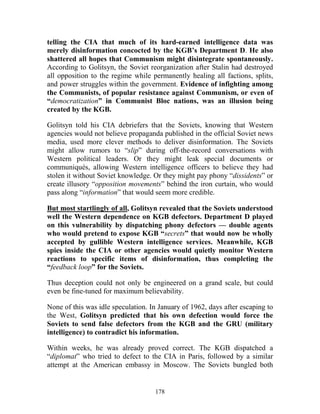


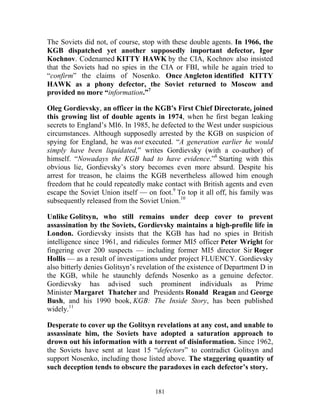
![182
The battle for the CIA
Yet despite all the clear evidence of a vast Soviet deception program using
false defectors, and despite growing evidence of Soviet spies in the highest
ranks of the CIA, Angleton and Golitsyn ultimately lost the struggle to
save the agency.
Virtually every investigation Angleton initiated was either blocked,
terminated, or undermined. He was never allowed to uncover a single
major spy or false defector. Angry CIA officers in every department
frantically derailed his probes, and howled protests every time he
questioned the reliability of a defector. Gradually Angleton’s enemies
closed ranks to destroy him.
The purge began in 1969, on orders from above, by phasing out
Golitsyn’s advisory relationship with the CIA. President Richard Nixon,
who in the early 1950s had blocked an investigation by Senator Joseph
McCarthy of Communist spies in the CIA [See Part 1— Eds.], wanted
nothing to interfere with his program of détente.12
Then came William E. Colby, who in 1973 was promoted to Executive
Comptroller, the number three position in the CIA. His career had
certainly raised eyebrows. He had come from the CIA’s covert action wing
in Vietnam, rather than involvement in true intelligence work. As chief of
the CIA’s Rome station in the 1950s, Colby had fought hard to provide
covert CIA support to Communist front organizations in Italy — over
Angleton’s vigorous opposition. During the Vietnam War, Colby vetoed
Angleton’s plan to use counterintelligence to weed out Communist
infiltrators in the South Vietnamese government, thus ensuring that
hundreds of Communists would continue to paralyze the war effort
from within. Most suspiciously of all, Colby met several times with a
Soviet GRU agent in Vietnam — without notifying the CIA. Colby even
managed to shut down a CIA program to investigate Communists in
American labor unions. Although CIA officials constantly overlooked
Colby’s actions and promoted him, the Counterintelligence Division had
long suspected Colby of being a Soviet mole.13
In January of 1973, Colby issued a new directive to all CIA stations
worldwide. These orders permanently changed the operational methods of
the CIA, effectively overturning every warning Golitsyn and Angleton](https://image.slidesharecdn.com/mccarthyswaragainstcommunism-150816032113-lva1-app6892/85/Mccarthys-war-against-communism-182-320.jpg)





![188
_____________________________________________________________
Soviet Espionage in the U.S.
_____________________________________________________________
From Wikipedia, the free encyclopedia
(Redirected from History of Soviet and Russian espionage in the United
States)
Not to be confused with Russian espionage in the United States.
Since the late 1920s, the Soviet Union, through
its GRU, OGPU and NKVD intelligence services, used Russian and foreign-
born nationals as well as Communist, and people of American origin to
perform espionage activities in the United States.[1][2][3]
These various
espionage networks had contact with various U.S. government agencies,
transmitting to Moscow information that would have been deemed
confidential.[1][2][3]
Contents
• 1 First efforts
• 2 Browder and Golos networks
• 3 Secret apparatus
• 4 Soble spy ring
• 5 Wartime espionage
o 5.1 Atomic bomb secrets
o 5.2 The Silvermaster spy ring
• 6 Aftermath
• 7 See also
• 8 References
• 9 Further reading
• 10 External links
First efforts
During the 1920s Soviet intelligence focused on military and industrial
espionage in the United States, specifically in the aircraft and munitions
industries, and penetrating the mainline federal government bureaucracies,](https://image.slidesharecdn.com/mccarthyswaragainstcommunism-150816032113-lva1-app6892/85/Mccarthys-war-against-communism-188-320.jpg)
![189
such as the United States Department of State and War Department.[citation
needed]
These efforts had mixed results. A front organization was created by
a NKVD agent in 1928 for the infiltration and placement of scientists into
industry and government: the Federation of Architects, Engineers, Chemists,
and Technicians (FAECT). "The FAECT never attracted enough followers
to make an impact in labor conditions, but it served the progressive cause in
other ways."[4]
Browder and Golos networks
One chief aim was the infiltration, placement, and subversion of American
political life at all levels of society. Earl Browder, General Secretary of
the Communist Party of the United States (CPUSA), served as an agent
recruiter himself on behalf of Soviet intelligence.[1][5]
Browder later stated that "by the mid-thirties, the Party was not putting its
principal emphasis on recruiting members." Left unstated was his intent to
use party members for espionage work, where suitable. Browder advocated
the use of a United Front involving other members of the left, both to
strengthen advocacy of pro-Soviet policy and to enlarge the pool of potential
recruits for espionage work. The illegal residency of NKVD in the US was
established in 1934 by the former Berlin resident Boris Bazarov.[6]
In
1935, NKVD agent Iskhak Akhmerov entered the US with false identity
papers to assist Bazarov in the collection of useful intelligence, and operated
without interruption until 1939, when he left the US. Akhmerov's wife, an
American who worked for Soviet intelligence, was Helen Lowry (Elza
Akhmerova), the niece of CPUSA General Secretary Earl Browder. Recent
information from Soviet archives have revealed that Browder's younger
sister Marguerite worked until 1938 as an NKVD operative in Europe. She
discontinued this work only when Browder himself requested her release
from duty, fearful that her work would compromise his position as General
Secretary.[1]
In the 1930s, the chief Soviet espionage organization operating in the U.S.
became the GRU. J. Peters headed the secret apparatus that supplied internal
government documents from the Ware group to the GRU. Browder assisted
Peters in building a network of operatives in the administration of
President Franklin D. Roosevelt. This group included Alger Hiss, John Abt,
and Lee Pressman. Courier for the group at the time was Whittaker
Chambers. Browder oversaw the efforts of Jacob Golos and his
girlfriend, Elizabeth Bentley, whose network of agents and sources included](https://image.slidesharecdn.com/mccarthyswaragainstcommunism-150816032113-lva1-app6892/85/Mccarthys-war-against-communism-189-320.jpg)
![190
two key figures at the Department of Treasury, Nathan Gregory
Silvermaster and Harry Dexter White.
One early Soviet spy ring was headed by Jacob Golos. Jake Golos (birth
name Jacob Golosenko, Tasin, Rasin or Raisen) was a Ukrainian-born
Bolshevik revolutionary and Soviet secret police (NKVD) operative in the
USSR. He was also a longtime senior official of the CPUSA involved in
covert work and cooperation with Soviet intelligence agencies. He took over
an existing network of agents and intelligence sources from Earl Browder.
Golos' controller was the head of the NKVD's American desk, Gaik
Ovakimian, also known as "The Puppetmaster", who would later serve a key
role in the assassination of Leon Trotsky.[7]
Golos was the "main pillar" of
the NKVD intelligence network. He had worked with Soviet intelligence
from the mid-1930s, and probably earlier. He was not merely a CPUSA
official assisting the NKVD (an agent or “probationer” in Soviet intelligence
parlance) but held official rank in the NKVD, and claimed to be an
oldtime Chekist.
Golos established a company called World Tourists with money from Earl
Browder, the General Secretary. The firm, which posed as a travel agency,
was used to facilitate international travel to and from the United States by
Soviet agents and CPUSA members. World Tourists was also involved in
manufacturing fake passports, as Browder used such a false passport on
covert trips to the Soviet Union in 1936.[2]
At World Tourist, Golos
frequently met Bernard Schuster, an NKVD agent (code
name ECHO and DICK) and Communist Party functionary who carried out
background investigations for Golos as part of the vetting process of agent
candidates.[8]
In March 1940, Golos pled guilty to being an
unregistered foreign agent, paid a $500 fine, and served probation in lieu of
a four-month prison sentence.
Soviet intelligence did not like Golos' refusal to allow Soviet contact with
his sources (a measure implemented by Golos to protect himself and to
ensure his continued retention by the NKVD). The NKVD suspected Golos
of Trotskyism and tried to lure him to Moscow, where he could be arrested,
but the US government got to him first. But even then, he did not reveal his
agent network. After Browder went to prison in 1940, Golos took over
running Browder's agents. In 1941, Golos set up a commercial forwarding
enterprise, called the US Shipping and Service Corporation, with Elizabeth
Bentley, his lover, as one of its officers.[1][2]](https://image.slidesharecdn.com/mccarthyswaragainstcommunism-150816032113-lva1-app6892/85/Mccarthys-war-against-communism-190-320.jpg)
![191
Sometime in November 1943, Golos met in New York City with key figures
of the Perlo group, a group working in several government departments and
agencies in Washington, D.C. The group was already in the service of
Browder. Later that same month, after a series of heart attacks over the
previous two years, Golos died in bed in Bentley's arms. Bentley then took
over his operations (thus the reference in the decrypts to him as a “former”
colleague).[citation needed]
Secret apparatus
By the end of 1936 at least four mid-level State Department officials were
delivering information to Soviet intelligence: Alger Hiss, assistant to
Assistant Secretary of State Francis Sayre; Julian Wadleigh, economist in
the Trade Agreements Section; Laurence Duggan, Latin American division;
and Noel Field, West European division. Whittaker Chambers later testified
that the plans for a tank design with a revolutionary new
suspension invented by J. Walter Christie (then being tested in the U.S.A.)
were procured and put into production in the Soviet Union as the Mark BT,
later developed into the famous Soviet T-34 tank.[9][10][11]
In 1993, experts from the Library of Congress traveled to Moscow to copy
previously secret archives of Communist Party USA (CPUSA) records, sent
to the Soviet Union for safekeeping by party organizers. The records provide
an irrefutable record of Soviet intelligence and cooperation provided by
those in the radical left in the United States from the 1920s through the
1940s. Some documents revealed that the CPUSA was actively involved in
secretly recruiting party members from African-American groups and rural
farm workers. The records contained further evidence that Soviet
sympathizers had indeed infiltrated the State Department, beginning in the
1930s. Included were letters from two U.S. ambassadors in Europe
to President Franklin D. Roosevelt and a senior State Department official.
Thanks to an official in the State department sympathetic to the Party, the
confidential correspondence, concerning political and economic matters in
Europe, ended up in the hands of Soviet intelligence.[12]
In the late 1930s and 1940 the OGPU, known as the Political Directorate,
used the U.S. as one of several staging areas for multiple OGPU plots to
murder exiled Soviet leader Leon Trotsky, then living in Mexico City. It was
American Communists who infiltrated Trotsky’s killer, the CatalanRamón
Mercader, into his own household. They were also central to the NKVD's
unsuccessful efforts to free the killer from a Mexican prison. [citation needed]](https://image.slidesharecdn.com/mccarthyswaragainstcommunism-150816032113-lva1-app6892/85/Mccarthys-war-against-communism-191-320.jpg)
![192
Soble spy ring
Jacob Albam and the Sobles (Jack and Myra) were indicted on espionage
charges by the FBI in 1957; all three were later convicted and served prison
terms. The Zlatovskis remained in Paris, France, where the laws did not
allow their extradition to the United States for espionage. Robert Soblen was
sentenced to life in prison for his espionage work at Sandia National
Laboratories, but jumped bail and escaped to Israel. After being expelled
from that country, he later committed suicide in Great Britain while awaiting
extradition back to the United States.[1][13]
Wartime espionage
During the second world war, Soviet espionage agents obtained classified
reports on electronic advances in radio-beacon artillery fuses by Emerson
Radio, including a complete proximity fuse (reportedly the same fuse design
that was later installed on Soviet anti-aircraft missiles to shoot down Francis
Gary Powers' U-2 in 1960).[citation needed]
Thousands of documents from
the National Advisory Committee for Aeronautics(NACA) were
photocopied or stolen, including a complete set of design and production
drawings for Lockheed Aircraft's new P-80 Shooting Star fighter jet.[14]
Atomic bomb secrets
Joseph Stalin directed Soviet intelligence officers to collect information in
four main areas. Pavel Fitin, the 34-year-old chief of the KGB First
Directorate, was directed to seek American intelligence concerning Hitler's
plans for the war in Russia; secret war aims of London and Washington,
particularly with regard to planning for Operation Overlord, the second front
in Europe; any indications the Western Allies might be willing to make a
separate peace with Hitler; and American scientific and technological
progress, particularly in the development of an atomic weapon.
The Silvermaster spy ring
The United States Treasury Department was successfully penetrated by
nearly a dozen Soviet agents or information sources, including Harold
Glasser and his superior, Harry Dexter White, assistant secretary of the
treasury and the second most influential official in the department.[1][2]
In
Late May 1941 Vitaly Pavlov, a 25-year-old NKVD officer, approached
White and attempted to secure his assistance to influence U.S. policy
towards Japan. White agreed to assist Soviet intelligence in any way he
could. The principal function of White was to aid in the infiltration and](https://image.slidesharecdn.com/mccarthyswaragainstcommunism-150816032113-lva1-app6892/85/Mccarthys-war-against-communism-192-320.jpg)
![193
placement of Soviet operatives within the government, and protecting
sources.[citation needed]
When security concerns arose around Nathan Gregory
Silvermaster, White protected him in his sensitive position at the Board of
Economic Warfare. White likewise was a purveyor of information and
resources to assist Soviet aims, and agreed to press for release of German
occupation currency plates to the Soviet Union. The Soviets later used the
plates to print unrestricted sums of money to exchange for U.S. and Allied
hard goods.[15]
In August 1945 Elizabeth Bentley, fearful of assassination by the Soviet
MGB, turned herself in to the government.[citation needed]
She implicated many
agents and sources in the Golos and Silvermaster spy networks, and was the
first to accuse Harry Dexter White of acting on behalf of Soviet interests in
releasing occupation plates to Moscow, later confirmed by Soviet archives
and former KGB officers.[5][15]
Aftermath
President Harry S. Truman's Executive Order 9835 of 22 March 1947
tightened protections against subversive infiltration of the US Government,
defining disloyalty as membership on a list of subversive organizations
maintained by the Attorney General. However Truman was opposed to
the McCarran Internal Security Act of 1950, calling it a "Mockery of the Bill
of Rights" and a "long step towards totalitarianism".[16]
See also
• American espionage in the Soviet Union
• Russian espionage in the United States
• List of Soviet agents in the United States
• List of Americans in the Venona papers
• Active measures
• Ware group
• Golos spy ring
• Silvermaster spy ring
• Perlo group
• Whittaker Chambers
• Alger Hiss
• Ethel and Julius Rosenberg
• Pavel Sudoplatov](https://image.slidesharecdn.com/mccarthyswaragainstcommunism-150816032113-lva1-app6892/85/Mccarthys-war-against-communism-193-320.jpg)


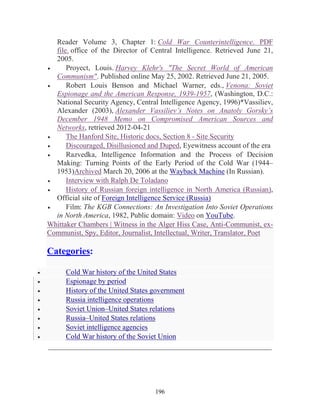


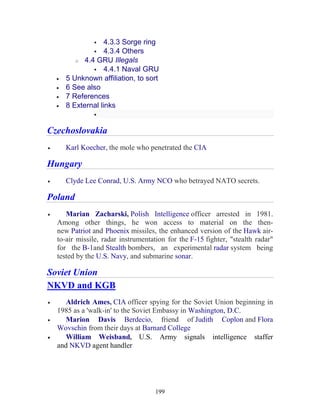
![200
The "Berg" – "Art" Cell
• Alexander Koral, former engineer of the municipality of New York.
• Helen Koral, Berg’s wife, housewife.
• Byron T. Darling, engineer for the Rubber Company.[1][2]
• A. A. Yatskov
• George Blake, United Kingdom SIS officer who betrayed existence
of the Berlin Tunnel under the Soviet sector and who probably betrayed
Popov.
• Felix Bloch, U.S. State Department economic officer. Robert
Hanssen warned Soviets about the investigation into his activities [3]
[6]
• Christopher John Boyce and Daulton Lee, American walk-in spy
for the Soviet Union, known as the Falcon and the Snowman.
Buben Cell
• Louis F. Budenz, former member of the Central Committee of
the Communist Party USA, former editor of the newspaper Daily
Worker, professor at Fordham University.
• Robert Menaker, commercial traveler (traveling salesman) to a
variety of trade firms
• Salmond Franklin, without specific assignments, husband of “Rita.”
Used as a “signaler” [Russian: sviazist = communications man]
• Sylvia Caldwell, technical secretary for a Trotskyist group in New
York City.
• Lona Cohen, sentenced to 20 years; subject of Hugh Whitemore's
drama for stage and TV Pack of Lies
• Morris Cohen sentenced to 25 years; subject of Hugh Whitemore's
drama for stage and TV Pack of Lies
• Judith Coplon, KGB counter-intelligence operative in the U.S.
Department of Justice; two convictions overturned on technicalities
• Eugene Dennis, senior member of the Communist Party USA
leadership, convicted of advocating the overthrow of the U.S.
government an sentenced to five years
• Dieter Gerhardt, South African Navy Commodore who was
convicted of spying for the Soviet Union; alleged that the Vela
Incident was a joint Israeli-South African nuclear test after being
released in 1994 and emigrating to Switzerland](https://image.slidesharecdn.com/mccarthyswaragainstcommunism-150816032113-lva1-app6892/85/Mccarthys-war-against-communism-200-320.jpg)
![201
• Theodore Hall, physicist who supplied information from Los
Alamos during World War II, a NYC walk-in, never prosecuted
• Robert P. Hanssen, Federal Bureau of Investigation agent convicted
of spying for the Soviet Union, betrayed tunnel under new Mt Alto
Soviet Embassy in Washington DC; may have done most damage since
Philby
• Reino Häyhänen, Finn who worked in the US as a Soviet spy
directed by Rudolf Abel, used the VIC cypher, defected to the US [7]
• Edward Lee Howard, ex-Central Intelligence Agency officer who
sold info and escaped to Soviet Union in 1985
• Clayton J. Lonetree, U.S. Marine Embassy guard Sergeant suborned
by female KGB agent ('Violetta Sanni') in Moscow, turned himself in to
authorities in December 1986, convicted 1987
Mocase Cell
• Boris Morros, Hollywood producer
• Jack Soble, sentenced to 7 years, brother of Robert Soblen
• Myra Soble, sentenced to 5½ years
• Robert Soblen, sentenced to life for spying at Sandia Lab, etc., but
escaped to Israel, then committed suicide
• Jane Zlatovski
• Mark Zborowski
Perlo Cell
• Victor Perlo, was the Chief of the Aviation Section of the War
Production Board during World War II; head of branch in Research
Section, Office of Price Administration Department of Commerce;
Division of Monetary Research Department of the Treasury; and later
the Brookings Institution
• Harold Glasser, Director, Division of Monetary Research, United
States Department of the Treasury; United Nations Relief and
Rehabilitation Administration; War Production Board; Adviser on North
African Affairs Committee; United States Treasury Representative to
the Allied High Commission in Italy
• Alger Hiss, Director of the Office of Special Political Affairs United
States Department of State
• Charles Kramer, Senate Subcommittee on War Mobilization; Office
of Price Administration; National Labor Relations Board; Senate](https://image.slidesharecdn.com/mccarthyswaragainstcommunism-150816032113-lva1-app6892/85/Mccarthys-war-against-communism-201-320.jpg)
![202
Subcommittee on Wartime Health and Education; Agricultural
Adjustment Administration; Senate Subcommittee on Civil Liberties;
Senate Labor and Public Welfare Committee; Democratic National
Committee
• Harry Magdoff, Statistical Division of War Production Board and
Office of Emergency Management; Bureau of Research and Statistics,
WTB; Tools Division, War Production Board; Bureau of Foreign and
Domestic Commerce, United States Department of Commerce
• Allen Rosenberg, Board of Economic Warfare; Chief of the
Economic Institution Staff, Foreign Economic Administration; Senate
Subcommittee on Civil Liberties; Senate Committee on Education and
Labor; Railroad Retirement Board; Counsel to the Secretary of the
National Labor Relations Board
Redhead Cell
• Hedwiga Gompertz, Wacek’s wife, sent to the U.S. in 1938 to carry
out fieldwork assignments, defected in 1948
• Paul Massing, scientist at Columbia University’s Institute of Social
Research.
• Laurence Duggan (aka 19th), former employee of the State
Department. Suicide.
• Rudolf Roessler chief of the very successful, and very odd, Lucy spy
ring of World War II
Rosenberg Cell
• Joel Barr, met Julius Rosenberg at City College of New York, later
spied with him and Al Sarant at Army Signal Corps lab in New Jersey;
escaped prosecution by fleeing to Soviet bloc in 1950. Died 2007.
• Abraham Brothman, indicted, convicted, and served two years in
prison on a charge of conspiring to obstruct justice, along with co-
defendant Miriam Moskowitz.[4]
Abraham Brothman gave secret
industrial information to Elizabeth Bentley, who turned it over to the
Soviet Union.[5]
• Klaus Fuchs, physicist who supplied information about the British
and American atomic bomb research to the Soviet Union; sentenced to
14 years in the UK.
• Vivian Glassman, fiancée of Joel Barr [8]
• Harry Gold, courier sentenced to 30 years](https://image.slidesharecdn.com/mccarthyswaragainstcommunism-150816032113-lva1-app6892/85/Mccarthys-war-against-communism-202-320.jpg)
![203
• David Greenglass, draftsman at Los Alamos in World War II, gave
atomic bomb drawings to his sister Ethel Rosenberg, and eventually the
Soviets; sentenced to 15 years
• Ruth Greenglass, escaped prosecution in exchange for her husband's
testimony against his sister and brother-in-law, the Rosenbergs
• Miriam Moskowitz, convicted of obstruction of justice for
helping Harry Gold concoct a phony story for a 1947 grand jury
investigation[6]
and served two years in prison[7]
for assisting her business
partner, Abraham Brothman.[5]
Moskowitz did not testify in her own
defense, stating later that she was "intimate" with Brothman and did not
want to be "branded a harlot".[8]
She was never convicted of being a spy
for the Soviet Union,[6]
but was convicted on the testimony of Harry
Gold and Elizabeth Bentley.[9]
• William Perl, active in Young Communist League at CCNY, then
met Al Sarant at Columbia University; served 5 years for perjury
• Morton Sobell, involved with Barr, Perl and Julius Rosenberg
at CCNY; sentenced to 30 years at Alcatraz
• Ethel Rosenberg, executed at Sing Sing prison near her native New
York City for conspiracy to commit espionage
• Julius Rosenberg, executed at Sing Sing prison near his native New
York City for conspiracy to commit espionage
• Al Sarant, stole radar secrets at Army Signal Corps lab in New
Jersey, then he and his mistress abandoned their families for the
protection of his Soviet masters in 1950
• Andrew Roth, Office of Naval Intelligence liaison officer
with United States Department of State
• Saville Sax college friend of Theodore Hall assisted with Hall's
disclosure to the Soviets of Los Alamos research and
development [9] [10]
Silvermaster Cell
• Nathan Gregory Silvermaster, Chief Planning Technician,
Procurement Division, United States Department of the Treasury; Chief
Economist, War Assets Administration; Director of the Labor Division,
Farm Security Administration; Board of Economic Warfare;
Reconstruction Finance Corporation Department of Commerce
• Helen Silvermaster (wife)
• Schlomer Adler, United States Department of the Treasury](https://image.slidesharecdn.com/mccarthyswaragainstcommunism-150816032113-lva1-app6892/85/Mccarthys-war-against-communism-203-320.jpg)
![204
• Norman Chandler Bursler, United States Department of
Justice Anti-Trust Division [10][dead link]
• Frank Coe, Assistant Director, Division of Monetary Research,
Treasury Department; Special Assistant to the United States Ambassador
in London; Assistant to the Executive Director, Board of Economic
Warfare; Assistant Administrator, Foreign Economic Administration
• Lauchlin Currie, Administrative Assistant to President Roosevelt;
Deputy Administrator of Foreign Economic Administration; Special
Representative to China
• Bela Gold, Assistant Head of Program Surveys, Bureau of
Agricultural Economics, Agriculture Department; Senate Subcommittee
on War Mobilization; Office of Economic Programs in Foreign
Economic Administration
• Sonia Steinman Gold, Division of Monetary Research U.S. Treasury
Department; U.S. House of Representatives Select Committee on
Interstate Migration; U.S. Bureau of Employment Security
• Irving Kaplan, Foreign Funds Control and Division of Monetary
Research, United States Department of the Treasury Foreign Economic
Administration; chief advisor to the Military Government of Germany
• George Silverman, civilian Chief Production Specialist, Material
Division, United States Army Air Forces Air Staff, War Department,
Pentagon
• William Henry Taylor, Assistant Director of the Middle East
Division of Monetary Research, United States Department of Treasury
• William Ullman, delegate to United Nations Charter meeting
and Bretton Woods conference; Division of Monetary Research,
Department of Treasury; Material and Services Division, Air Corps
Headquarters, Pentagon
• Anatole Volkov
• Harry Dexter White, Assistant Secretary of the Treasury; Head of
the International Monetary Fund[11]
Sound and Myrna Cells
• Solomon Adler, United States Department of the Treasury
• Cedric Belfrage, journalist; British Security Coordination
• Elizabeth Bentley courier messenger for Communist spy rings on the
American East Coast in the 1930s, testified about her activities in
hearings in the 1940s and 1950s](https://image.slidesharecdn.com/mccarthyswaragainstcommunism-150816032113-lva1-app6892/85/Mccarthys-war-against-communism-204-320.jpg)

![206
• Harry Magdoff, Chief of the Control Records Section of War
Production Board and Office of Emergency Management; Bureau of
Research and Statistics, WTB; Tools Division, War Production Board;
Bureau of Foreign and Domestic Commerce, United States Department
of Commerce; Statistics Division Works Progress Administration
• Jenny Levy Miller, Chinese Government Purchasing Commission
• Robert Miller, Office of the Coordinator of Inter-American Affairs;
Near Eastern Division United States Department of State
• Willard Park, Assistant Chief of the Economic Analysis Section,
Office of the Coordinator of Inter-American Affairs; United Nations
Relief and Rehabilitation Administration
• Victor Perlo, chief of the Aviation Section of the War Production
Board; head of branch in Research Section, Office of Price
Administration Department of Commerce; Division of Monetary
Research Department of Treasury; Brookings Institution, head of Perlo
group
• Mary Price, stenographer for Walter Lippmann of the New York
Herald
• William Remington, War Production Board; Office of Emergency
Management, convicted for perjury, killed in prison
• Ruth Rivkin, United Nations Relief and Rehabilitation
Administration
• Allan Rosenberg, Board of Economic Warfare; Chief of the
Economic Institution Staff, Foreign Economic Administration; Civil
Liberties Subcommittee, Senate Committee on Education and Labor;
Railroad Retirement Board; Counsel to the Secretary of the National
Labor Relations Board
• Bernard Schuster[12]
• Greg Silvermaster, Chief Planning Technician, Procurement
Division, United States Department of the Treasury; Chief Economist,
War Assets Administration; Director of the Labor Division, Farm
Security Administration; Board of Economic Warfare; Reconstruction
Finance Corporation Department of Commerce
• John Spivak, journalist[citation needed]
• William Taylor, Assistant Director of Monetary Research, United
States Department of Treasury
• Helen Tenney, Office of Strategic Services
• Lud Ullman, delegate to United Nations Charter meeting and Bretton
Woods conference; Division of Monetary Research, Department of](https://image.slidesharecdn.com/mccarthyswaragainstcommunism-150816032113-lva1-app6892/85/Mccarthys-war-against-communism-206-320.jpg)
![207
Treasury; Material and Services Division, Air Corps Headquarters,
Pentagon
• David Weintraub, United States Department of State; head of the
Office of Foreign Relief and Rehabilitation Operations; United Nations
Relief and Rehabilitation Administration (UNRRA); United Nations
Division of Economic Stability and Development
• Donald Wheeler, Office of Strategic Services Research and Analysis
division
• Anatoly Gorsky, (Anatoly Veniaminovich Gorsky, A. V. Gorsky),
“Vadim”, former rezident of the MGB USSR in Washington
• Olga Pravdina, former employee of the Ministry of Trade, wife of
“Sergei,” the rezident in New York; author of Gorsky
Memo (see Vladimir Pravdin)[13]
• Vladimir Pravdin, “Sergei”, Tass, former rezident of the MGB
USSR in New York
• Mikhail A. Shaliapin [Shalyapin], “Stock” [“Shtok”][14]
• Gaik Badelovich Ovakimian, former rezident of the MGB USSR in
New York
• Iskhak Abdulovich Akhmerov, “Albert” – former Illegal
Rezident of the MGB USSR in New York
• Michael Straight, speechwriter for President Franklin Roosevelt
• John Anthony Walker US Navy senior enlisted man who spied for
the Soviet Union for decades, enlisting family and friends to do so as
well
Ware Cell
• Whittaker Chambers, Department of State, testified against Alger
Hiss
• Henry Collins, National Recovery Administration; Department of
Agriculture
• John Herrmann, CPUSA operative and courier, eventually drank
himself to death in Mexico
• Alger Hiss, Department of State, sentenced to 5 years for perjury
• Donald Hiss, Department of State, younger brother of Alger Hiss
• Victor Perlo, became spymaster of Perlo group during World War II
• George Silverman, Harvard-educated statistician who gave
secret Pentagon documents to Nathan Silvermaster group during World
War II](https://image.slidesharecdn.com/mccarthyswaragainstcommunism-150816032113-lva1-app6892/85/Mccarthys-war-against-communism-207-320.jpg)

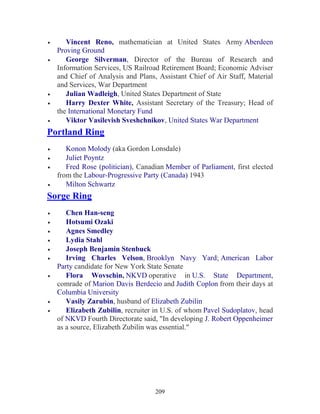
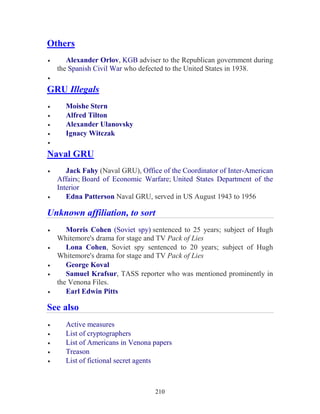
![211
References
1. Jump up^ Hayes commentary
2. Jump up^ Haynes, John Earl (February 2007), Cover Name,
Cryptonym, CPUSA Party Name, Pseudonym, and Real Name Index:
A Research Historian's Working Reference, retrieved 2007-04-29
3. Jump up^ Victor Cherkashin (Author), Gregory Feifer, Spy
Handler: Memoir of a KGB Officer, Basic Books (January
2005), ISBN 0-465-00968-9, pages 246-247.
4. Jump up^ [1] National Committee to Reopen the Rothenberg
Case
5. ^ Jump up to: a b
[2] National Security Archive, More Cold War
Espionage Transcripts Unsealed
6. ^ Jump up to: a b
Guilty Time: December 04, 1950
7. Jump up^ [3] Miriam Moskowitz's memoir of McCarthyism :
The New Yorker
8. Jump up^ "The Grey Zone". Snap Judgement. Episode 210 (in
English). 19 Oct 2012. 30 minutes in. PRX and NPR. KBGA 89.9
FM, WCAI/WNAN, and WRNC-LP.
9. Jump up^ [4] Early Cold War Spies: The Espionage Trials that
Shaped American Politics, by John Earl Haynes, Harvey Klehr
10. Jump up^ Underground Soviet Espionage (NKVD) in
Agencies of the United States Government
11. Jump up^ Steil, Benn (2013). The Battle of Bretton Woods:
John Maynard Keynes, Harry Dexter White, and the Making of a New
World Order. Princeton University Press. pp. 4,
23. ISBN 9780691149097.
12. Jump up^ Earl M. Hyde, Bernard Schuster and Joseph Katz:
KGB Master Spies in the United States, International Journal of
Intelligence and Counter Intelligence, Volume 12, Issue 1 March
1999.
13. Jump up^ Underground Soviet Espionage (NKVD) in
Agencies of the United States Government, FBI Silvermaster
file, Vol. 82, pg. 327 pdf, October 21, 1946.
14. Jump up^ *Alexander Vassiliev, Notes on A. Gorsky’s Report
to Savchenko S.R., 23 December 1949. [5]](https://image.slidesharecdn.com/mccarthyswaragainstcommunism-150816032113-lva1-app6892/85/Mccarthys-war-against-communism-211-320.jpg)


![214
_____________________________________________________________
The Venona Project
From Wikipedia, the free encyclopedia
The Venona project was a counter-intelligence program initiated by the
United States Army Signal Intelligence Service (a forerunner of the
National Security Agency) that lasted from 1943 to 1980.[1]
The program
attempted to decrypt messages sent by Soviet Union intelligence agencies,
including its foreign intelligence service and military intelligence
services.[2]
During the program's four decades, approximately 3,000
messages were at least partially decrypted and translated.[3]
The project
produced some of the most important breakthroughs for western counter-
intelligence in this period, including the discovery of the Cambridge spy
ring[4]
and the exposure of Soviet espionage targeting the Manhattan
Project.[5]
The project was one of the most sensitive secrets of United States
intelligence. It remained secret for over a decade after it ended and was not
officially declassified until 1995.
Contents
[hide]
• 1 Background
o 1.1 Commencement
• 2 Decryption
o 2.1 Breakthrough
o 2.2 Results
o 2.3 Significance
• 3 Bearing of Venona on particular cases
o 3.1 Julius and Ethel Rosenberg
o 3.2 Klaus Fuchs
o 3.3 Alger Hiss and Harry Dexter White
o 3.4 Donald Maclean and Guy Burgess
o 3.5 Soviet espionage in Australia
o 3.6 Ramón Mercader](https://image.slidesharecdn.com/mccarthyswaragainstcommunism-150816032113-lva1-app6892/85/Mccarthys-war-against-communism-214-320.jpg)
![215
4 Public disclosures
• 5 Texas textbook controversy
• 6 Critical views
• 7 See also
• 8 Notes
• 9 References and further reading
o 9.1 Books
o 9.2 Online sources
Background
Gene Grabeel, the first cryptoanalyst of the Venona project[6]
During the initial years of the Cold War, the Venona project was a source of
information on Soviet intelligence-gathering activity that was directed at the
Western military powers. Although unknown to the public, and even to
Presidents Franklin D. Roosevelt and Harry S. Truman, these programs were
of importance concerning crucial events of the early Cold War. These
included the Julius and Ethel Rosenberg spying case and the defections
of Donald Maclean and Guy Burgess to the Soviet Union.
Most decipherable messages were transmitted and intercepted between 1942
and 1945. Sometime in 1945, the existence of the Venona program was
revealed to the Soviet Union by the NKVD agent and United States Army
SIGINT analyst and cryptologist Bill Weisband.[7]
These messages were
slowly and gradually decrypted beginning in 1946 and continuing (many
times at a low-level of effort in the latter years) through 1980, when the
Venona program was terminated, and the remaining amount of effort that
was being spent on it was moved to more important projects.](https://image.slidesharecdn.com/mccarthyswaragainstcommunism-150816032113-lva1-app6892/85/Mccarthys-war-against-communism-215-320.jpg)
![216
To what extent the various individuals were involved with Soviet
intelligence is a topic of dispute. While a number of academics and
historians assert that most of the individuals mentioned in the Venona
decrypts were most likely either clandestine assets and/or contacts of Soviet
intelligence agents,[8][9]
others argue that many of those people probably had
no malicious intentions and committed no crimes.[10][11][12]
Commencement
The Venona Project was initiated in 1943, under orders from the deputy
Chief of Military Intelligence (G-2), Carter W. Clarke.[13]
Clarke
distrusted Joseph Stalin, and feared that the Soviet Union would sign a
separate peace with the Third Reich, allowing Germany to focus its military
forces against Great Britain and the United States.[14]
Code-breakers of the
US Army's Signal Intelligence Service (commonly called Arlington Hall)
analyzed encrypted high-level Soviet diplomatic intelligence messages
intercepted in large volumes during and immediately after World War II by
American, British, and Australian listening posts.[15]
Decryption
This message traffic, which was encrypted with a one-time pad system, was
stored and analyzed in relative secrecy by hundreds of cryptanalysts over a
40-year period starting in the early 1940s. Due to a serious blunder on the
part of the Soviets, some of this traffic was vulnerable to cryptanalysis. The
Soviet company that manufactured the one-time pads produced around
35,000 pages of duplicate key numbers, as a result of pressures brought
about by the German advance on Moscow during World War II. The
duplication—which undermines the security of a one-time system—was
discovered and attempts to lessen its impact were made by sending the
duplicates to widely-separated users.[16]
Despite this, the reuse was detected
by cryptologists in the US.](https://image.slidesharecdn.com/mccarthyswaragainstcommunism-150816032113-lva1-app6892/85/Mccarthys-war-against-communism-216-320.jpg)
![217
Breakthrough
Genevieve Feinstein [17]
The Soviet systems in general used a code to convert words and letters into
numbers, to which additive keys (from one-time pads) were added,
encrypting the content. When used correctly, one-time pad encryption is
unbreakable.[18]
Cryptanalysis by American and British code-breakers
revealed that some of the one-time pad material had incorrectly been reused
by the Soviets (specifically, entire pages, although not complete books),
which allowed decryption (sometimes only partial) of a small part of the
traffic.
Generating the one-time pads was a slow and labor-intensive process, and
the outbreak of war with Germany in June 1941 caused a sudden increase in
the need for coded messages. It is probable that the Soviet code generators
started duplicating cipher pages in order to keep up with demand.
It was Arlington Hall's Lieutenant Richard Hallock, working on Soviet
"Trade" traffic (so called because these messages dealt with Soviet trade
issues), who first discovered that the Soviets were reusing pages. Hallock
and his colleagues (including Genevieve Feinstein, Cecil Phillips, Frank
Lewis, Frank Wanat, and Lucille Campbell) went on to break into a
significant amount of Trade traffic, recovering many one-time pad additive
key tables in the process.](https://image.slidesharecdn.com/mccarthyswaragainstcommunism-150816032113-lva1-app6892/85/Mccarthys-war-against-communism-217-320.jpg)
![218
Meredith Gardner (far left); most of the other code breakers were
young women.
A young Meredith Gardner then used this material to break into what turned
out to be NKVD (and later GRU) traffic by reconstructing the code used to
convert text to numbers. Samuel Chew and Cecil Phillips also made valuable
contributions. On 20 December 1946, Gardner made the first break into the
code, revealing the existence of Soviet espionage in the Manhattan
Project.[19]
Venona messages also indicated that Soviet spies worked in
Washington in the State Department, Treasury, Office of Strategic Services,
and even the White House. Very slowly, using assorted techniques ranging
from traffic analysis to defector information, more of the messages were
decrypted.
Claims have been made that information from the physical recovery of code
books (a partially burned one was obtained by the Finns) to bugging
embassy rooms in which text was entered into encrypting devices (analyzing
the keystrokes by listening to them being punched in) contributed to
recovering much of the plaintext. These latter claims are less than fully
supported in the open literature.
One significant aid (mentioned by the NSA) in the early stages may have
been work done in cooperation between the Japanese and Finnish
cryptanalysis organizations; when the Americans broke into Japanese codes
during World War II, they gained access to this information. There are also
reports that copies of signals purloined from Soviet offices by the Federal
Bureau of Investigation (FBI) were helpful in the cryptanalysis. The Finnish
radio intelligence sold much of its material concerning Soviet codes
to OSS in 1944 during Operation Stella Polaris, including the partially
burned code book.[20]](https://image.slidesharecdn.com/mccarthyswaragainstcommunism-150816032113-lva1-app6892/85/Mccarthys-war-against-communism-218-320.jpg)
![219
Results
NSA reported that (according to the serial numbers of the Venona cables)
thousands of cables were sent, but only a fraction were available to the
cryptanalysts. Approximately 2,200 messages were decrypted and translated;
about half for the 1943 GRU-Naval Washington to Moscow messages were
broken, but none for any other year, although several thousand were sent
between 1941 and 1945. The decryption rate of the NKVD cables was as
follows:
• 1942 1.8%
• 1943 15.0%
• 1944 49.0%
• 1945 1.5%
Out of some hundreds of thousands of intercepted encrypted texts, it is
claimed under 3,000 have been partially or wholly decrypted. All the
duplicate one-time pad pages were produced in 1942, and almost all of them
had been used by the end of 1945, with a few being used as late as 1948.
After this, Soviet message traffic reverted to being completely
unreadable.[21]
The existence of Venona decryption became known to the Soviets within a
few years of the first breaks.[citation needed]
It is not clear whether the Soviets
knew how much of the message traffic or which messages had been
successfully decrypted. At least one Soviet penetration agent, British Secret
Intelligence Service representative to the U.S. Kim Philby, was told about
the project in 1949, as part of his job as liaison between British and U.S.
intelligence. Since all of the duplicate one-time pad pages had been used by
this time, the Soviets apparently did not make any changes to their
cryptographic procedures after they learned of Venona. However, this
information allowed them to alert those of their agents who might be at risk
of exposure due to the decryption.
Significance
The decrypted messages gave important insights into Soviet behavior in the
period during which duplicate one-time pads were used. With the first break
into the code, Venona revealed the existence of Soviet espionage[22]
at Los
Alamos National Laboratories.[23]
Identities soon emerged of American,
Canadian, Australian, and British spies in service to the Soviet government,
including Klaus Fuchs, Alan Nunn May, and Donald Maclean. Others](https://image.slidesharecdn.com/mccarthyswaragainstcommunism-150816032113-lva1-app6892/85/Mccarthys-war-against-communism-219-320.jpg)
![220
worked in Washington in the State Department, the Treasury, Office of
Strategic Services,[24]
and even the White House.
The decrypts show the U.S. and other nations were targeted in major
espionage campaigns by the Soviet Union as early as 1942. Among those
identified are Julius and Ethel Rosenberg; Alger Hiss; Harry Dexter
White,[13]
the second-highest official in the Treasury Department; Lauchlin
Currie,[25]
a personal aide to Franklin Roosevelt; and Maurice Halperin,[26]
a
section head in the Office of Strategic Services.
The identification of individuals mentioned in Venona transcripts is
sometimes problematic, since people with a "covert relationship" with
Soviet intelligence are referenced by cryptonyms.[27]
Further complicating
matters is the fact the same person sometimes had different cryptonyms at
different times, and the same cryptonym was sometimes reused for different
individuals. In some cases, notably Hiss, the matching of a Venona
cryptonym to an individual is disputed. In many other cases, a Venona
cryptonym has not yet been linked to any person. According to authors John
Earl Haynes and Harvey Klehr, the Venona transcripts identify
approximately 349 Americans whom they claim had a covert relationship
with Soviet intelligence, though fewer than half of these have been matched
to real-name identities.[28]
However, not every agent may have been
communicating directly with Soviet intelligence. Each of those 349 persons
may have had many others working for, and reporting only to, them.
The Office of Strategic Services, the predecessor to the CIA, housed at one
time or another between fifteen and twenty Soviet spies.[29]
Duncan
Lee, Donald Wheeler, Jane Foster Zlatowski, and Maurice Halperin passed
information to Moscow. The War Production Board, the Board of Economic
Warfare, the Office of the Coordinator of Inter-American Affairs and
the Office of War Information, included at least half a dozen Soviet sources
each among their employees. In the opinion of some, almost every American
military and diplomatic agency of any importance was compromised to
some extent by Soviet espionage.[30]
Some scholars and journalists dispute the claims by Haynes, Klehr, and
others concerning the precision of the matching of cryptonyms to actual
persons.[31]
Also contested is the implication that all 349 persons identified
had an intentional "covert relationship" with Soviet intelligence; it is argued,
in some cases, the individual may have been an unwitting information
source or a prospect for future recruitment by Soviet intelligence.](https://image.slidesharecdn.com/mccarthyswaragainstcommunism-150816032113-lva1-app6892/85/Mccarthys-war-against-communism-220-320.jpg)
![221
Bearing of Venona on particular cases
Venona has added information—some unequivocal, some ambiguous—to
several espionage cases. Some known spies, including Theodore Hall, were
neither prosecuted nor publicly implicated, because the Venona evidence
against them was not made public.
The identity of Soviet source cryptonymed '19' remains unclear. According
to British writer Nigel West, '19' was president of Czechoslovak
government-in-exile Edvard Beneš.[32]
Military historian Eduard
Mark[33]
and American authors Herbert Romerstein and Eric Breindel
concluded it was Roosevelt's aide Harry Hopkins.[34]
According to American
authors John Earl Haynes and Harvey Klehr, source code-named '19' could
be someone from the British delegation to the Washington Conference in
May 1943.[35]
Moreover, they argue no evidence of Hopkins as an agent has
been found in other archives, and the partial message relating to "19" does
not indicate if this source was a spy.[36]
However, Vasily Mitrokhin was a KGB archivist who defected from the
Soviet Union with copies of KGB files. He claimed Harry Hopkins was a
secret Russian agent.[37]
Moreover, Oleg Gordievsky, a high-level KGB
officer who also defected from the Soviet Union, reported that Iskhak
Akhmerov, the KGB officer who controlled the clandestine Soviet agents in
the U.S. during the war, had said Hopkins was “the most important of all
Soviet wartime agents in the United States."[38]
Julius and Ethel Rosenberg
Main article: Julius and Ethel Rosenberg
Venona has added significant information to the case of Julius and Ethel
Rosenberg, making it clear Julius was guilty of espionage, but also showing
that Ethel was probably no more than an accomplice, if that.[citation
needed]
Venona and other recent information has shown, while the content of
Julius' atomic espionage was not as vital as alleged at the time of his
espionage activities, in other fields it was extensive. The information
Rosenberg passed to the Soviets concerned the proximity fuze, design and
production information on the Lockheed P-80 jet fighter, and thousands of
classified reports from Emerson Radio. The Venona evidence indicates
unidentified sources code-named "Quantum" and "Pers" who facilitated
transfer of nuclear weapons technology to the Soviet Union from positions
within the Manhattan Project. According to Alexander Vassiliev's notes
from KGB archive, "Quantum" was Boris Podolsky and "Pers" was Russell](https://image.slidesharecdn.com/mccarthyswaragainstcommunism-150816032113-lva1-app6892/85/Mccarthys-war-against-communism-221-320.jpg)
![222
W. McNutt, an engineer from the uranium processing plant in Oak
Ridge.[39][40]
Klaus Fuchs
Main article: Klaus Fuchs
Venona is also responsible for the exposure of the atomic spy Klaus Fuchs.
The Venona documents released in 1950 disclose information about the
clandestine activities of Klaus Fuchs under his code names of CHARLES
and REST. During his time on the Manhattan Project, the NSA learned of
this relations with the KGB.[41]
On April 10, 1945, the Moscow office sent a
message to New York concerning Fuchs' contribution to the Soviet atomic
bomb development. This letter stated that Fuchs “is of great value," and his
reports “contain information received for the first time about the
electromagnetic method of separation of the atomic bomb." [42]
Alger Hiss and Harry Dexter White
Main articles: Alger Hiss and Harry Dexter White
According to the Moynihan Commission on Government Secrecy, the
complicity of both Alger Hiss and Harry Dexter White is conclusively
proven by Venona,[43][44]
stating "The complicity of Alger Hiss of the State
Department seems settled. As does that of Harry Dexter White of the
Treasury Department." In his 1998 book, Senator Moynihan expresses
certainty about Hiss's identification by Venona as a Soviet spy, writing "Hiss
was indeed a Soviet agent and appears to have been regarded by Moscow as
its most important."[45]
Several current authors, researchers, and archivists consider the Venona
evidence on Hiss to be inconclusive.[46]
Donald Maclean and Guy Burgess
When Kim Philby learned of Venona in 1949, he obtained advance warning
that his fellow Soviet spy Donald Maclean was in danger of being exposed.
The FBI told Philby about an agent cryptonymed 'Homer', whose 1945
message to Moscow had been decoded. As it had been sent from New York
and had its origins in the British Embassy in Washington, Philby, who
would not have known Maclean's cryptonym, deduced the sender's identity.
By early 1951, Philby knew U.S. intelligence would soon also conclude
Maclean was the sender, and advised Moscow to recall Maclean. [clarification
needed]
This led to Maclean and Guy Burgess' flight to Russia in May 1951.[47]](https://image.slidesharecdn.com/mccarthyswaragainstcommunism-150816032113-lva1-app6892/85/Mccarthys-war-against-communism-222-320.jpg)
![223
Soviet espionage in Australia
In addition to British and American operatives, Australians collected
Venona intercepts at a remote base in the Outback.[citation needed]
The Soviets
remained unaware of this base as late as 1950.[48]
The founding of the Australian Security Intelligence
Organisation by Labor Prime Minister Ben Chifley in 1949 was considered
highly controversial within Chifley's own party.[citation needed]
Until then,
the left-leaning Australian Labor Party had been hostile to domestic
intelligence agencies on civil-liberties grounds and a Labor government
founding one seemed a surprising about-face.[citation needed]
But the
presentation of Venona material to Chifley, revealing evidence of Soviet
agents operating in Australia, brought this about. As well as Australian
diplomat suspects abroad, Venona had revealed Walter Seddon
Clayton (cryptonym 'KLOD'), a leading official within the Communist Party
of Australia(CPA), as the chief organiser of Soviet intelligence gathering in
Australia.[49]
Investigation revealed that Clayton formed an underground
network within the CPA so that the party could continue to operate if it were
banned. [citation needed]
Ramón Mercader
Main article: Ramón Mercader
Ramón Mercader was a Spanish communist who became infamous as the
assassin of the Russian Marxist revolutionary Leon Trotsky in 1940, in
Mexico. Declassified archives have shown that he was a Soviet agent.[50]
Upon being arrested for the assassination, Mercader claimed to be "Jacques
Mornard", and that Trotsky died during a quarrel they had relating to
Mercader/Mornard's desire to marry a woman whom Trotsky did not want
him to marry.[51]
Mercader's true identity was confirmed by the Venona
project.[52]
Public disclosure
For much of its history, knowledge of Venona was restricted even from the
highest levels of government. Senior army officers, in consultation with the
FBI and CIA, made the decision to restrict knowledge of Venona within the
government (even the CIA was not made an active partner until 1952). Army
Chief of Staff Omar Bradley, concerned about the White House's history of
leaking sensitive information, decided to deny President Truman direct
knowledge of the project. The president received the substance of the](https://image.slidesharecdn.com/mccarthyswaragainstcommunism-150816032113-lva1-app6892/85/Mccarthys-war-against-communism-223-320.jpg)
![224
material only through FBI, Justice Department, and CIA reports on
counterintelligence and intelligence matters. He was not told the material
came from decoded Soviet ciphers. To some degree this secrecy was
counter-productive; Truman was distrustful of FBI head J. Edgar
Hoover and suspected the reports were exaggerated for political purposes.
Some of the earliest detailed public knowledge that Soviet code messages
from World War II had been broken came with the release of Robert
Lamphere's book, The FBI-KGB War, in 1986. Lamphere had been the FBI
liaison to the code-breaking activity, had considerable knowledge of Venona
and the counter-intelligence work that resulted from it. MI5 assistant
director Peter Wright's 1987 memoir, Spycatcher, however, was the first
detailed account of the Venona project, identifying it by name and making
clear its long-term implications in post-war espionage.
Many inside the NSA had argued internally that the time had come to
publicly release the details of the Venona project, but it was not until 1995
that the bipartisan Commission on Government Secrecy, with
Senator Moynihan as chairman, released Venona project materials.
Moynihan wrote:
"[The] secrecy system has systematically denied American historians access
to the records of American history. Of late we find ourselves relying on
archives of the former Soviet Union in Moscow to resolve questions of what
was going on in Washington at mid-century. [...] the Venona intercepts
contained overwhelming proof of the activities of Soviet spy networks in
America, complete with names, dates, places, and deeds."[53]
One of the considerations in releasing Venona translations was the privacy
interests of the individuals mentioned, referenced, or identified in the
translations. Some names were not released because to do so would
constitute an invasion of privacy.[54]
However, in at least one case,
independent researchers identified one of the subjects whose name had been
obscured by the NSA.
The dearth of reliable information available to the public—or even to the
President and Congress—may have helped to polarize debates of the 1950s
over the extent and danger of Soviet espionage in the United States. Anti-
Communists suspected many spies remained at large, perhaps including
some known to the government. Those who criticized the governmental and
non-governmental efforts to root out and expose communists felt these
efforts were an overreaction (in addition to other reservations
about McCarthyism). Public access—or broader governmental access—to](https://image.slidesharecdn.com/mccarthyswaragainstcommunism-150816032113-lva1-app6892/85/Mccarthys-war-against-communism-224-320.jpg)
![225
the Venona evidence would certainly have affected this debate, as it is
affecting the retrospective debate among historians and others now. As the
Moynihan Commission wrote in its final report:
"A balanced history of this period is now beginning to appear; the Venona
messages will surely supply a great cache of facts to bring the matter to
some closure. But at the time, the American Government, much less the
American public, was confronted with possibilities and charges, at once
baffling and terrifying."
The National Cryptologic Museum features an exhibit on the Venona project
in its "Cold War/Information Age" gallery.
Texas textbook controversy
Controversy arose in 2009 over the Texas State Board of Education's
revision of their high school history class curricula to suggest Venona
shows Senator Joseph McCarthy to have been justified in his zeal in
exposing those whom he believed to be Soviet spies or communist
sympathizers.[55]
Critics assert most people and organizations identified by
McCarthy were not mentioned in the Venona content and that the sources
for his accusations remain largely unknown.[56]
Critical views
The majority of historians are convinced of the historical value of the
Venona material. Intelligence historian Nigel West believes that "Venona
remain[s] an irrefutable resource, far more reliable than the mercurial
recollections of KGB defectors and the dubious conclusions drawn by
paranoid analysts mesmerized by Machiavellian plots."[57]
However, a number of writers and scholars have taken a critical view of the
translations released by the NSA. A few critics, including Robert and
Michael Meeropol, the sons of Ethel and Julius Rosenberg, and activist
lawyer William Kunstler, cast doubt on the authenticity of the Venona
material, suggesting that it might have been at least in part forged.[58]
Other critics have questioned the accuracy of the translations and the
identifications of cover names that the NSA translations give. Writers Walter
and Miriam Schneir, in a lengthy 1999 review of one of the first book-length
studies of the messages, object to what they see as the book’s
overconfidence in the translations’ accuracy, noting that the undecrypted
gaps in the texts can make interpretation difficult, and emphasizing the](https://image.slidesharecdn.com/mccarthyswaragainstcommunism-150816032113-lva1-app6892/85/Mccarthys-war-against-communism-225-320.jpg)
![226
problem of identifying the individuals mentioned under cover names.[59]
To
support their critique, they cite a declassified memorandum, written in 1956
by A. H. Belmont, who was assistant to FBI director J. Edgar Hoover at the
time.[60]
In the memo, Belmont discusses the possibility of using the Venona
translations in court to prosecute Soviet agents, and comes out strongly
opposed to their use. His reasons include legal uncertainties about the
admissibility of the translations as evidence, and the difficulties that
prosecution would face in supporting the validity of the translations.
Belmont highlights the uncertainties in the translation process, noting that
the cryptographers have indicated that “almost anything included in a
translation of one of these deciphered messages may in the future be
radically revised." He also notes the complexities of identifying people with
cover names, describing how the personal details mentioned for cover name
“Antenna" fit more than one person, and the investigative process required
to finally connect “Antenna" to Julius Rosenberg. The Schneirs conclude
that "A reader faced with Venona's incomplete, disjointed messages can
easily arrive at a badly skewed impression."[61]
Many of the critiques of the Venona translations have been based on specific
cases. The Schneirs' critique of the Venona documents was based on their
decades of work on the case of Ethel and Julius Rosenberg. Another critique
of the Venona translations came from the late Rutgers University law
professor John Lowenthal, who as a law student worked as a volunteer for
Alger Hiss's defense team, and later wrote extensively on the Hiss
case.[62]
Lowenthal's critique focused on one message (Venona 1822 KGB
Washington-Moscow 30 March 1945),[63]
in which the comments identified
the cover name 'Ales' as "probably Alger Hiss." Lowenthal raised a number
of objections to this identification, rejecting it as "a conclusion
psychologically motivated and politically correct but factually
wrong."[64]
Lowenthal's article led to an extended debates on the 'Ales'
message,[65]
and even prompted the NSA to declassify the original Russian
text.[66]
Currently Venona 1822 is the only message for which the complete
decrypted Russian text has been published.
Victor Navasky, editor and publisher of The Nation, has also written several
editorials highly critical of John Earl Haynes' and Harvey Klehr's
interpretation of recent work on the subject of Soviet espionage.[31]
Navasky
claims the Venona material is being used to “distort … our understanding of
the cold war" and that the files are potential “time bombs of
misinformation."[10]
Commenting on the list of 349 Americans identified by
Venona, published in an appendix to Venona: Decoding Soviet Espionage in](https://image.slidesharecdn.com/mccarthyswaragainstcommunism-150816032113-lva1-app6892/85/Mccarthys-war-against-communism-226-320.jpg)
![227
America, Navasky wrote, "The reader is left with the implication— unfair
and unproven— that every name on the list was involved in espionage, and
as a result, otherwise careful historians and mainstream journalists now
routinely refer to Venona as proof that many hundreds of Americans were
part of the red spy network."[10]
Navasky goes further in his defense of the
listed people and has claimed a great deal of the so-called espionage that
went on was nothing more than “exchanges of information among people of
good will" and that “most of these exchanges were innocent and were within
the law."[11]
According to historian Ellen Schrecker, "Because they offer insights into the
world of the secret police on both sides of the Iron Curtain, it is tempting to
treat the FBI and Venona materials less critically than documents from more
accessible sources. But there are too many gaps in the record to use these
materials with complete confidence."[67]
Schrecker believes the documents established the guilt of many prominent
figures, but is still critical of the views of scholars such as John Earl Haynes,
arguing, "complexity, nuance, and a willingness to see the world in other
than black and white seem alien to Haynes' view of history."[68]
See also
• Espionage Act of 1917
• History of Soviet and Russian espionage in the United States
• List of Americans in the Venona papers
• List of Soviet agents in the United States
• McCarthyism
• Taman Shud Case
• Elizabeth Bentley
Notes
1. Jump up^ Benson, Robert L. (2001). The Venona Story (PDF). Fort George G.
Meade, MD: National Security Agency, Center for Cryptologic History. p. 1.
2. Jump up^ Benson 2001, p. 5
3. Jump up^ Benson 2001, p. 7
4. Jump up^ Benson 2001, p. 34
5. Jump up^ Benson 2001, pp. 20–22. Benson gives a basic list of the relevant
messages; other accounts include Haynes and Klehr, p. 304, and West, p. 197.
6. Jump up^ "'Remembrances of Venona' by Mr. William P. Crowell", NSA. 11 July
1995.
7. Jump up^ Andrew, Christopher (1996). For the President's Eyes Only: Secret
Intelligence and the American Presidency from Washington to Bush. Harper Perennial.](https://image.slidesharecdn.com/mccarthyswaragainstcommunism-150816032113-lva1-app6892/85/Mccarthys-war-against-communism-227-320.jpg)
![228
8. Jump up^ "How VENONA was Declassified", Robert L. Benson, Symposium of
Cryptologic History; October 27, 2005.
9. Jump up^ "Tangled Treason", Sam Tanenhaus, The New Republic, 1999.
10. ^ Jump up to:a b c
Navasky, Victor (July 16, 2001). "Cold War Ghosts". The Nation.
Retrieved 2006-06-27.
11. ^ Jump up to:a b
Tales from decrypts. The Nation, 28 October 1996, pp. 5–6.
12. Jump up^ Schrecker, Ellen. "Comments on John Earl Haynes', "The Cold War
Debate Continues: A Traditionalist View of Historical Writing on Domestic Communism and
Anti-Communism"". Retrieved 2006-06-27.
13. ^ Jump up to:a b
Benson 2001
14. Jump up^ "Haynes & Klehr ''New York Times'' 1999". Nytimes.com. Retrieved 2014-
02-15.
15. Jump up^ Yuri Modin, My Five Cambridge Friends, 1994, Ballantine Books, ISBN 0-
374-21698-3, p. 194
16. Jump up^ Cryptologic Almanac 50th Anniversary Series -- VENONA: An Overview
(DOCID: 3575728). Released by NSA on 06-12-2009, FOIA Case # 52567.
17. Jump up^ "Women in Cryptologic History - Genevieve Feinstein - NSA/CSS".
Nsa.gov. 2009-01-15. Retrieved 2014-02-15.
18. Jump up^ Francis Litterio. "Why Are One-Time Pads Perfectly Secure?". Archived
from the original on 2008-05-16.
19. Jump up^ Daniel Patrick Moynihan (1997). "Report of the Commission On Protecting
And Reducing Government Secrecy; Appendix A: The Experience of The Bomb". United
States Government Printing Office. Retrieved 2006-06-18.
20. Jump up^ West, Nigel (2000). Venona: the greatest secret of the Cold War. London:
HarperCollins. pp. 3–10.ISBN 9780006530718.
21. Jump up^ Haynes, John Earl and Klehr, Harvey (2000). Venona: Decoding Soviet
Espionage in America. Yale University Press. p. 55. ISBN 0-300-08462-5.
22. Jump up^ Moynihan, Daniel Patrick (1998). Secrecy : The American Experience.
Yale University Press. p. 54. ISBN 0-300-08079-4. "these intercepts provided... descriptions
of the activities of precisely the same Soviet spies who were named by defecting Soviet
agents Alexander Orlov, Walter Krivitsky, Whittaker Chambers, and Elizabeth Bentley."
23. Jump up^ Commission on Protecting and Reducing Government Secrecy. "A Brief
Account of the American Experience" (PDF).Report of the Commission on Protecting and
Reducing Government Secrecy. VI; Appendix A. US Government Printing Office. pp. A–27.
Retrieved 2006-06-26. "Thanks to successful espionage, the Russians tested their first atom
bomb in August 1949, just four years after the first American test. As will be discussed, we
had learned of the Los Alamos spies in December 1946—December 20, to be precise. The
US Army Security Agency, in the person of Meredith Knox Gardner, a genius in his own right,
had broken one of what it termed the Venona messages—the transmissions that Soviet
agents in the United States sent to and received from Moscow."
24. Jump up^ Commission on Protecting and Reducing Government Secrecy. "A Brief
Account of the American Experience" (PDF).Report of the Commission on Protecting and
Reducing Government Secrecy. VI; Appendix A. US Government Printing Office. pp. A–7.
Retrieved 2006-06-26. "KGB cables indicated that the Office of Strategic Services (OSS) in
World War II had been thoroughly infiltrated with Soviet agents."
25. Jump up^ "Eavesdropping on Hell" (PDF). National Security Agency. Retrieved 2006-
06-26. "Currie, known as PAZh (Page) and White, whose cover names were YuRIST (Jurist)
and changed later to LAJER (Lawyer), had been Soviet agents since the 1930s. They had
been identified as Soviet agents in Venona translations and by other agents turned witnesses
or informants for the FBI and Justice Department. From the Venona translations, both were
known to pass intelligence to their handlers, notably the Silvermaster network."
26. Jump up^ Warner, Michael (2000). "The Office of Strategic Services: America's First
Intelligence Agency; Chapter: X-2". Central Intelligence Agency Publications. Retrieved 2006-
06-27.[dead link]
27. Jump up^ Moynihan, Daniel Patrick (1998). Secrecy : The American Experience.
Yale University Press. p. 54. ISBN 0-300-08079-4.](https://image.slidesharecdn.com/mccarthyswaragainstcommunism-150816032113-lva1-app6892/85/Mccarthys-war-against-communism-228-320.jpg)
![229
28. Jump up^ Haynes, John Earl and Klehr, Harvey (2000). Venona: Decoding Soviet
Espionage in America. Yale University Press. p. 12. ISBN 0-300-08462-5.
29. Jump up^ Warner, Michael (2000). "The Office of Strategic Services: America's First
Intelligence Agency; Chapter: X-2". Central Intelligence Agency Publications. Archived
from the original on 2007-05-10. Retrieved 2006-06-26.
30. Jump up^ Peake, Hayden B. (Summer 2000). "The Venona Progeny". Naval War
College Review LIII (3). Archived from the original on August 17, 2000. Retrieved 2006-06-
26.
31. ^ Jump up to:a b
Haynes, John Earl; Herman, Arthur (February 2000). "Joseph
McCarthy: Reexamining the Life and Legacy of America's Most Hated
Senator" (Speech). Venona Exchange. Washington: Haynes. Retrieved 4 July 2013.
32. Jump up^ Nigel West, Venona, największa tajemnica zimnej wojny, Warszawa 2006,
p.138.
33. Jump up^ Eduard Mark. "Venona's Source 19 and the Trident Conference of May
1943: Diplomacy or Espionage?". Intelligence and National Security. London, Summer 1998,
pp. 1–31
34. Jump up^ Romerstein, Herbert and Breindel, Eric (2000). The Venona Secrets:
Exposing Soviet Espionage and America's Traitors. Regnery Publishing. p. 214. ISBN 0-
89526-275-4.
35. Jump up^ Haynes, John Earl and Klehr, Harvey (1999). Venona: Decoding Soviet
Espionage in America. Yale University Press. pp. 205–206. ISBN 0-300-07771-8.
36. Jump up^ "H-Net Discussion Networks - VENONA, the KGB, and Harry Hopkins
[Haynes/Klehr]". H-net.msu.edu. 1999-07-14. Retrieved 2014-02-15.
37. Jump up^ "The Sword and the Shield: The Mitrokhin Archive and the Secret History
of the KGB," by Vasily Mitrokhin and Christopher Andrew.
38. Jump up^ "KGB: The Inside Story of Its Foreign Operations from Lenin to
Gorbachev," by Oleg Gordievsky and Christopher Andrew.
39. Jump up^ New York Times Book Review of "Venona - Decoding Soviet Espionage
in America"
40. Jump up^ Haynes, John Earl; Klehr, Harvey E.; Vassiliev, Alexander (2009). Spies:
The Rise and Fall of the KGB in America. New Haven: Yale University Press. pp. 73,
339. ISBN 0-300-12390-6.
41. Jump up^ Vassiliev-Notebooks-and-Venona-Index-Concordance.pdf, ed. 2013, pp:
325, 343
42. Jump up^ [1], NSA: Venona Monographs, pp: 8,14, 18-20
43. Jump up^ [2], NSA, ed. 2013, pp: 325, 343
44. Jump up^ "Appendix A; SECRECY; A Brief Account of the American
Experience" (PDF). From "Report Of The Commission On Protecting And Reducing
Government Secrecy". United States Government Printing Office. 1997. pp. A–37.[dead link]
"The
complicity of Alger Hiss of the State Department seems settled. As does that of Harry Dexter
White of the Treasury Department."
45. Jump up^ Linder, Douglas (2003). "The Venona Files and the Alger Hiss Case".
Retrieved 2006-06-27.
46. Jump up^ Moynihan, Daniel Patrick (1998). Secrecy: The American Experience.
Yale University Press. pp. 145–147. ISBN 0-300-08079-4.
47. Jump up^ See, for example:
Lowenthal (Autumn 2000). "Venona and Alger Hiss" (PDF). Intelligence and National Security.
p. 119. Retrieved2006-09-13.,
Navasky, Victor (July 16, 2001). "Cold War Ghosts". The Nation. Retrieved September
22, 2011.,
Theoharis, Athan (2002). Chasing Spies: How the FBI Failed in Counter-Intelligence But
Promoted the Politics of McCarthyism in the Cold War Years. Ivan R. Dee. ISBN 1-56663-
420-2.
48. Jump up^ Yuri Modin, My Five Cambridge Friends, 1994, Ballantine, p. 190–199
49. Jump up^ Yuri Modin, My Five Cambridge Friends, 1994, Ballantine, p. 191](https://image.slidesharecdn.com/mccarthyswaragainstcommunism-150816032113-lva1-app6892/85/Mccarthys-war-against-communism-229-320.jpg)

![231
References and further reading
Books[edit]
• Aldrich, Richard J. (2001). The Hidden Hand: Britain, America and Cold War Secret
Intelligence. John Murray Pubs Ltd. ISBN 0-7195-5426-8.
• Bamford, James (2002). Body of Secrets: Anatomy of the Ultra-Secret National Security
Agency. Anchor Books. ISBN 0-385-49908-6.
• Benson, Robert Louis (1996). Venona: Soviet Espionage and the American Response 1939–
1957. Aegean Park Press. ISBN 0-89412-265-7.
• Budiansky, Stephen (2002). Battle of Wits: The Complete Story of Codebreaking in World War
II. Free Press. ISBN 0-7432-1734-9.
• Haynes, John Earl and Klehr, Harvey (2000). Venona: Decoding Soviet Espionage in
America. Yale University Press. ISBN 0-300-08462-5.
• Haynes, John Earl; Klehr, Harvey E.; Vassiliev, Alexander (2009). Spies: The Rise and Fall of
the KGB in America. New Haven: Yale University Press. ISBN 0-300-12390-6.
• Lamphere, Robert J.; Shachtman, Tom (1995). The FBI-KGB War: A Special Agent's Story.
Mercer University Press. ISBN 0-86554-477-8.
• Schrecker, Ellen (1998). Many Are the Crimes : McCarthyism in America. Little,
Brown. ISBN 0-316-77470-7.
• Schrecker, Ellen (2006). Cold War Triumphalism: The Misuse of History After the Fall of
Communism. New Press. ISBN 1-59558-083-2.
• Romerstein, Herbert and Breindel, Eric (2000). The Venona Secrets: Exposing Soviet
Espionage and America's Traitors. Regnery Publishing. ISBN 0-89526-275-4.
• Theoharis, Athan (2002). Chasing Spies: How the FBI Failed in Counterintelligence But
Promoted the Politics of McCarthyism in the Cold War Years. Ivan R. Dee. ISBN 1-56663-420-2.
• Trahair, Richard C.S and Miller, Robert (2009). Encyclopedia of Cold War Espionage, Spies,
and Secret Operations. Enigma Books. ISBN 978-1-929631-75-9.
• Warner, Michael (1996). Venona - Soviet Espionage & American Response. Aegean Park
Press. ISBN 0-89412-265-7.
• West, Nigel (1999). Venona--The Greatest Secret of the Cold War. Harper Collins. ISBN 0-00-
653071-0.
• Wright, Peter; Paul Greengrass (1987). Spycatcher: The Candid Autobiography of a Senior
Intelligence Officer. Viking. ISBN 0-670-82055-5.
Online sources
• "NSA official Venona site". National Security Agency. Retrieved 2006-07-09.
• Venona PDFs, arranged by date (NSA)
• "Selected Venona Messages". Central Intelligence Agency. Retrieved 2007-11-08.
• "The American Response to Soviet Espionage". CIA. 1996. Retrieved 2007-11-08.
• Daniel Patrick Moynihan, Chairman (1997). "Report of the Commission On Protecting And
Reducing Government Secrecy". United States Government Printing Office. Retrieved 2006-06-
18.
• "MI5 Releases to the National Archives". MI5. Retrieved 2006-07-09.[dead link]
• Naranjo, Denis. "Venona Chronology 1939–1996". Retrieved 2006-07-09.
• "Red Files: Interview with Cecil Philips, US Signal Intelligence Service". PBS. Retrieved 2006-
07-09.
• Benson, Robert L. "The Venona Story". National Security Agency. Archived from the
original on 2006-06-14. Retrieved 2006-06-18.](https://image.slidesharecdn.com/mccarthyswaragainstcommunism-150816032113-lva1-app6892/85/Mccarthys-war-against-communism-231-320.jpg)
![232
• Fox, John F., Jr. (2005). "In the Enemy’s House: Venona and the Maturation of American
Counterintelligence". FBI. Archived from the original on 2006-11-15. Retrieved 2006-11-17.
• Romerstein , Herbert and Breindel, Eric (2000). "Preface to The Venona Secrets". Regnery
Publishing. Retrieved 2006-11-17.[dead link]
• "SECRETS, LIES, AND ATOMIC SPIES", PBS Transcript, Airdate: February 5, 2002
Categories:
• Venona project
• Military projects
• National Security Agency
• Espionage projects
• History of cryptography
• Spy rings
• Cold War espionage
• Soviet Union–United Kingdom relations
• Soviet Union–United States relations
_____________________________________________________________](https://image.slidesharecdn.com/mccarthyswaragainstcommunism-150816032113-lva1-app6892/85/Mccarthys-war-against-communism-232-320.jpg)
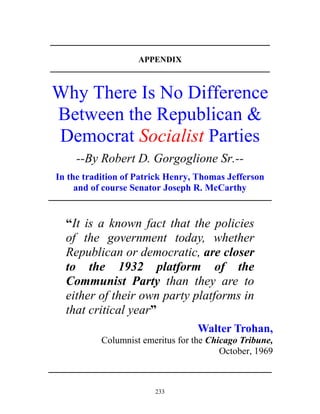


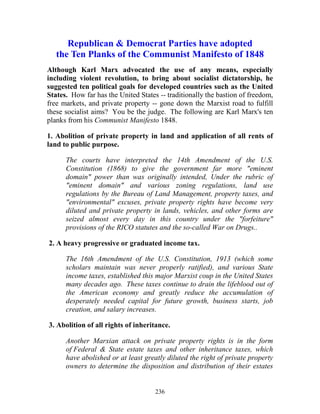
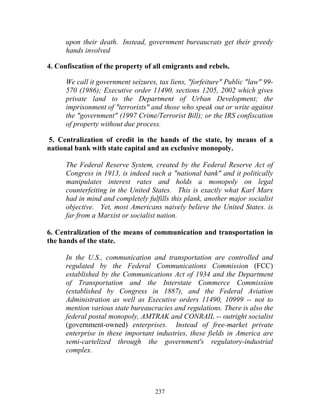


![240
government schools, fiat money and central banking (the Federal
Reserve), "environmentalist" regulations, property forfeiture laws, and
other Marxist planks and leftist institutions must be rolled back and
repealed altogether if we are to survive and restore the Constitution to
its former glory.
Those who would carry forward the ideas and principles of self-ownership,
private property, free markets, laissez faire, the rule of law, and
constitutionalism which informed America's founders must become more
active on the key ideological battle fronts. We need more influence not just
in politics, but in areas of entertainment, academia, journalism, think tanks,
churches, literature, art, and other venues of expression and activism.
Marxism and socialism have proved to be colossal failures all over the
world.
As Frederic Bastiat wrote in his classic “The Law” just
prior to his death, "let us now try liberty"!
___________________________________________________________
The Republican & Democrat Parties are also charged
With Completing the Communist Goals and Program of
“Toward Soviet America”.
In 1932, William Z. Foster, Chairman of the Communist Party USA
authored the book Toward Soviet America. Beginning on Page 277 he
declared that there would be:
....revolutionary nationalization or socialization [such as
environmentally restrictive controls and regulation] of the large
privately–owned ... factories, mines and power plant, ... railroads,
waterways, airways, bus lines [and] ... the whole body of forest,
mineral deposits, lakes, etc. ( National Parks and forests etc.)
On page 281, he added:
There will also be ... social insurance against unemployment, old age
[Social Security]....free medical services [Medicare, Medicaid &
Socialized Universal Health Care.] ...All houses and other buildings
will be socialized. [Government zoning, planning and safety](https://image.slidesharecdn.com/mccarthyswaragainstcommunism-150816032113-lva1-app6892/85/Mccarthys-war-against-communism-240-320.jpg)
![241
regulations etc.]
Now comes the shocker beginning on pages 316 - 317:
Superstition [religion] will vanish in the realm of science; ... class
ideologies ... will give place to scientific materialist philosophy
[Humanism]. ....the schools, colleges and universities will be grouped
under the National [Federal] Department of Education ... studies will
be revolutionized being cleansed of religious, patriotic, and other
features of bourgeois [middle class] ideology.
Science will become materialistic, hence truly scientific: God will be
banished from the laboratories as well as from the schools. ....there
will be a great organization of science, backed by the full power of the
government. [Sound familiar?]
On page 318 we read:
A National Department of Health [the Department of Health and
Human Services] will be set up. A free medical service ... will be
established. (Socialized Universal Health Care).
Foster - Toward Soviet America - The Book the Communists Tried
to...
Speak Up For Truth: Toward Soviet America
The Communist Takeover of America: 45 Declared Goals...
You have been given the irrefutable evidence of the
criminal charge that the Republican & Democrat Parties are
socialist. I rest my case!
So now, if you wish to live in the
“Union of Soviet Socialist States of America”,
continue voting for republicans & Democrats.
_______________________________________________
CONTINUED](https://image.slidesharecdn.com/mccarthyswaragainstcommunism-150816032113-lva1-app6892/85/Mccarthys-war-against-communism-241-320.jpg)
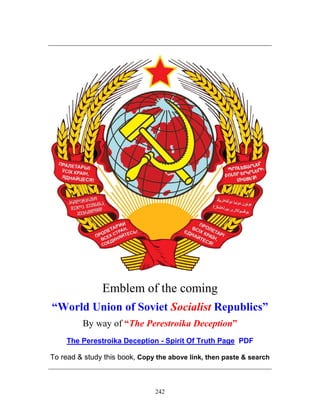
![243
_____________________________________________________________
“World Union of Socialist Soviet Republics”
_____________________________________________________________
The Communist’s version of this “New World Order” was issued by the
official 1936 program of the Communist International, an arm of the
Kremlin, is as follows:
Dictatorship can be established only by a victory of socialism in
different countries or groups of countries [European Union, North
American Union etc.] after which the proletariat [Communist]
republics would unite on federal lines with those already in existence
[Russia, China etc.] and this system of federal unions would expand at
length forming the “World Union of Socialist Soviet Republics.”
(Hearings before the Senate Committee on Foreign Relations,
July 11, 1956 p. 196 and The Fearful Master: A Second Look at
the United Nations by G. Edward Griffin, Western Island, 1964.)
The above program was further developed by William Z Foster,
National chairman of the Communist Party, U.S.A., from 1933-1957,
when he wrote:
A Communist world will be a unified, organized world [world
government-integrated socialized world economy]. The economic
system will be one great organization, based upon the principle of
planning now dawning in the USSR. The American soviet government
will be an important section in this world government. . . . (William
Z. Foster, Toward Soviet America, Balboa Island, California,
Elgin Publications, 1961, pp. 326-327.)
_____________________________________________________________
See the solution on the next page](https://image.slidesharecdn.com/mccarthyswaragainstcommunism-150816032113-lva1-app6892/85/Mccarthys-war-against-communism-243-320.jpg)


![246
It has been wrong from the beginning, from the day it was founded. From
the beginning, the Republican Party has worked without deviation for
bigger, more imperial government, for higher taxes, for more wars, for
more totalitarianism. From the beginning, the Republican Party has
been Red [Communist].
Why? In 1848, Communists rose in revolution across Europe, united by a
document prepared for the purpose, entitled Manifesto of the Communist
Party. Its author was a degenerate parasite named Karl Marx, whom a small
gang of wealthy Communists – the League of Just Men – hired for the
purpose. The Manifesto told its adherents and its victims what the
Communists would do.
But the Revolution of 1848 failed. The perpetrators escaped, just ahead
of the police. And they went, of course, to the United States. In 1856, the
Republican Party ran its first candidate for President. By that time, these
Communists from Europe had thoroughly infiltrated this country,
especially the North. Many became high ranking officers in the Union
Army and top government officials.
Down through the decades, Americans have wondered about Yankee
brutality in that war. Lee invaded the North, but that sublime Christian hero
forbade any forays against civilians. Military genius Stonewall Jackson
stood like a stone wall and routed the Yankees at Manassas, but when
Barbara Frietchie insisted on flying the Yankee flag in Frederick, Maryland,
rather than the Stars and Bars, that sublime Christian hero commanded,
according to John Greenleaf Whittier, “‘Who touches a hair of yon gray
head/Dies like a dog! March on!’ he said.”
But the Yankees, invading the South, were monsters, killing, raping and
destroying civilian property. In one Georgia town, some 400 women were
penned in the town square in the July heat for almost a week without access
to female facilities. It got worse when the Yankee slime got into the liquor.
Some two thousand Southern women and children were shipped north to
labor as slaves. Didn’t you learn that in school?
Sherman’s scorched earth March to the Sea was a horror the later
Nazis could not equal. Why? Because the Yankees hated Negro slavery so
much? There can be no doubt that the already strong Communist
influence in the North, combined with that of the maniacal abolitionists,](https://image.slidesharecdn.com/mccarthyswaragainstcommunism-150816032113-lva1-app6892/85/Mccarthys-war-against-communism-246-320.jpg)
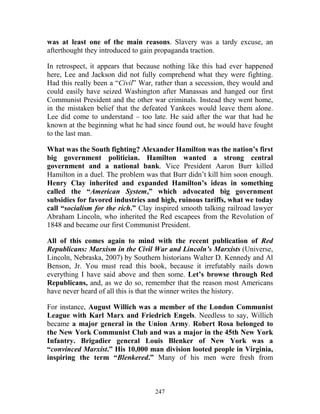


![250
Remember that slavery, for these Communists, was just an afterthought, a
tool. Before the War for Independence, it was the Southern colonies that
petitioned the King to stop importing slaves into the South. Did you
know that Jefferson tried to include in the Declaration of Independence a
complaint against the King because his government had forbidden the
colonies to end the slave trade? Jefferson’s language was deleted to avoid
giving offense to New England, which was making buckets of money
trading slaves.
Indeed, did you also know that if slavery was what the South fought to
defend, all it had to do was stay in the Union? Lincoln made clear that he
would defend slavery and would not free slaves owned by a man in a
state within the Union:
“I have no purpose, directly or indirectly, to interfere with the
institution of slavery in the States where it exists. I believe I have no
lawful right to do so, and I have no inclination to do so.”
Remember that the Emancipation Proclamation came well into the war. It
was a propaganda stunt that freed only the slaves in areas controlled by
the Confederacy; in other words, none. Meanwhile, prominent abolitionist
Robert E. Lee, the first man Lincoln offered command of the Union Army,
had freed his family’s slaves long before the war. So, what were the
Communists who came here after?
Republican Senator John Sherman, brother of the monster who
Marched to the Sea, advised his fellow senators to
“nationalize as much as possible [making] men love their country
before their states. All private interests, all local interests, all banking
interests, the interests of individuals, everything, should be
subordinate now to the interests of the Government.”
Germany was a decentralized collection of independent states. The goal
of the Forty Eighters there was a “united, indivisible republic” in which
those states would be dissolved. Land and private industry would be
confiscated. The government would be transformed into a Socialist
dictatorship. These are the ideas the Forty Eighters came to implement
here. By the way, that is what Hitler did in the 1930s. That is what the
fleeing Communists found so attractive in Lincoln.](https://image.slidesharecdn.com/mccarthyswaragainstcommunism-150816032113-lva1-app6892/85/Mccarthys-war-against-communism-250-320.jpg)
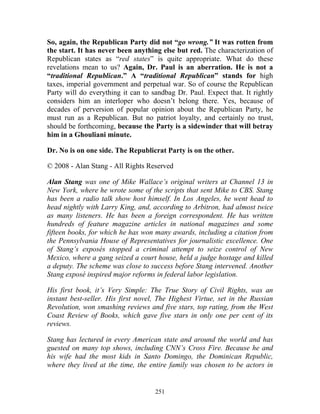
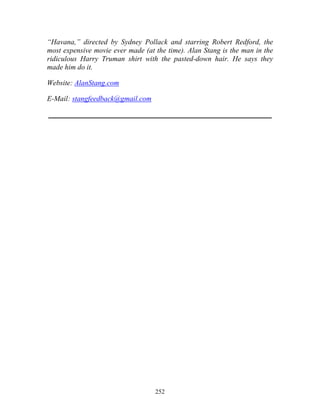

![254
_____________________________________________________________
About the Editor
_____________________________________________________________
I was born on December 21st
, 1943 in Baltimore Maryland along the
“Mason-Dixon Line” six months before D-Day.
At age 2, my family moved to Worcester Massachusetts Where I grew up
with a love of science and history. By age 18 (1962), my main interest
turned to history and current events which I followed very closely.
With the Berlin Crises, the Cuban “Bay of Pigs” betrayal etc (1961)., my
awareness of the threat and danger of Communism intensified to the point
that I went to my high school library (Jan. 1962) and borrowed two of J.
Edgar Hoover’s books, “Masters of Deceit” and “A Study of Communism”.
This was the beginning of a life long study of not only communism, but also
history, and Constitutional law in accordance with the “original intent” of
those who framed it. I also developed a keen interest in political economy
and political science.
I never attended a university or college. I have been self-educating myself
for over 50 years. (I took a 6 week course in U.S. History (1945-1975).
When I got through with the professor, he did not know whether he was
coming or going. I have library which I have been building up since 1966.
In 1964, while working at a Republican campaign office supporting then
U.S. Senator from Arizona, Barry Gold Water for president, I started reading
“None Dare Call it Treason”. My life was never the same again. I came to
realize that there was a great Communist-Insider international criminal
Conspiracy [A great secret combination] that had gained great influence and
control within the Federal Government.
This caused me to look into the John Birch Society which I joined in March
of 1966 where I viewed an extraordinary introductory film entitled
“Stand up for Freedom” featuring Ezra Taft Benson. In June of the
following year, I was baptized into the Church of Jesus Christ of Latter-day
Saints.](https://image.slidesharecdn.com/mccarthyswaragainstcommunism-150816032113-lva1-app6892/85/Mccarthys-war-against-communism-254-320.jpg)
